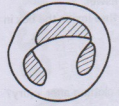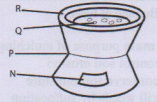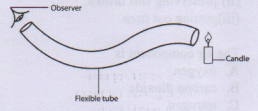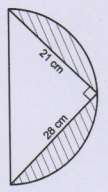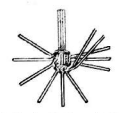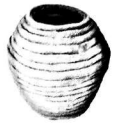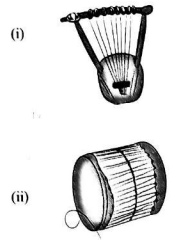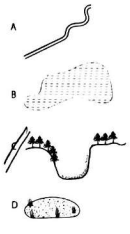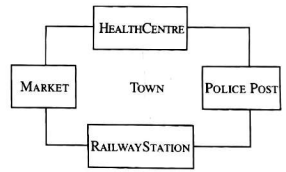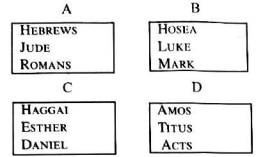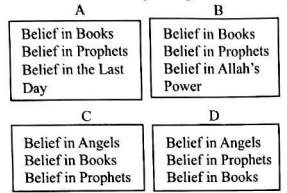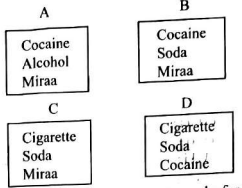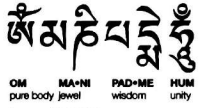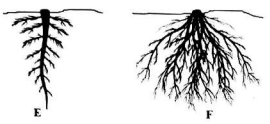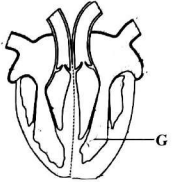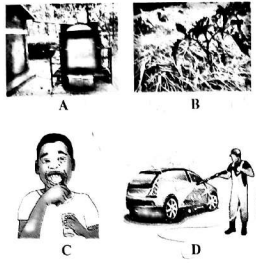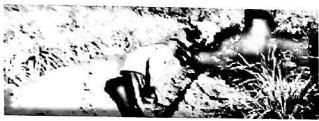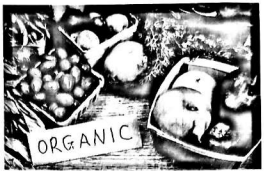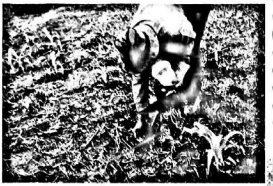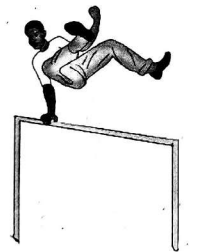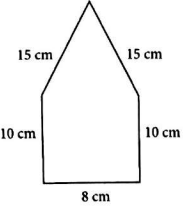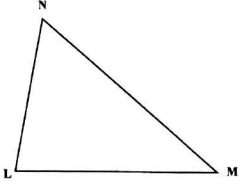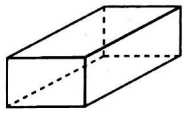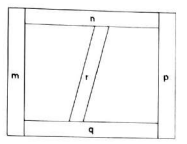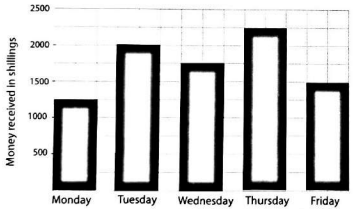Stella
Social Studies & Religious Education Questions - KCPE 2023 Past Papers
PART I: SOCIAL STUDIES
RIMBA AREA 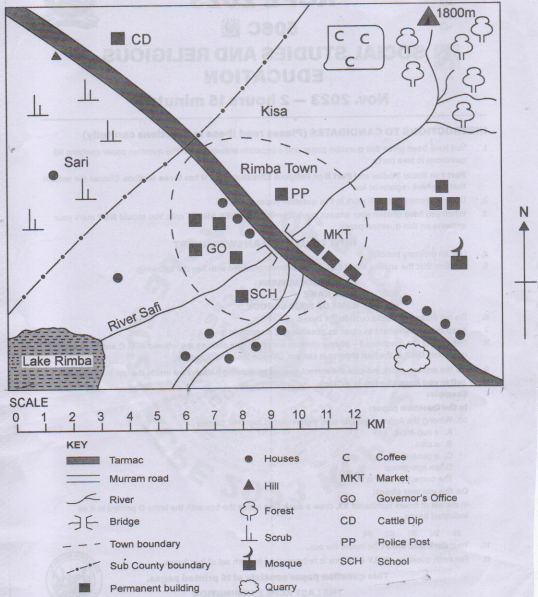
Study the map of Rimba Area provided and answer questions 1 - 7.
- The land in Rimba area rises from
- North West to South East
- North West to North East
- North East to South East
- South West to North East.
- The following economic activities are carried out in Rimba area except
- cattle rearing
- fishing
- banking
- trading.
- What is the approximate length of the murram road in Rimba area?
- 5 km.
- 13 km.
- 8 km.
- 6 km.
- The main factor that has influenced population settlements in Rimba area is
- transport
- security
- climate
- water.
- The religious building in Rimba area is used by
- Buddhists
- Muslims
- Christians
- Hindus.
- The social service that is urgently required by people in Rimba area is
- education
- security
- recreation
- health.
- Which of the following statements is true about Rimba area?
- The development is due to the quarry.
- River Safi drains into Lake Rimba.
- There are many cattle dips.
- Rimba area is administered by a chief.
- Which one of the following groups of communities in Kenya consists of Western Bantu?
- Agikuyu, Ambeere, Atharaka.
- Mijikenda, Pokomo, Adawida.
- Abakuria, Abaluhyia, Abasuba.
- Ameru, Abasuba, Akamba.
- Which one of the following is not a traditional method of foretelling weather?
- use of a rain gauge.
- croaking of frogs.
- migration of some birds.
- shedding of leaves of some trees.
- Which one of the following treatment was not given by traditional African medicine men?
- Mental disorder treatment.
- Fixing broken bones.
- Heart operation.
- Digestive disorder treatment.
- Below are statements describing a traditional form of government in East Africa.
- Grouped villages.
- Had a Parliament.
- Divided into sub counties.
- Leadership was inherited.
- Ruled by chiefs.
Which one of the following combinations of statements describe the Nyamwezi?- (i), (ii), (iv).
- (ii), (iii), (v).
- (iii), (iv), (v).
- (i), (iv), (v).
- The statements below describe the migration of a community into Kenya during the pre-colonial period.
- They migrated from South-West Ethiopia.
- They settled near Mount Moroto.
- They settled on the floor of the Rift Valley.
- They spread around the floor of the Rift Valley in search of pasture.
The community described above is the- Sabaot
- Acholi
- Turkana
- Pokot.
- The diagram below shows a weather measuring instrument.
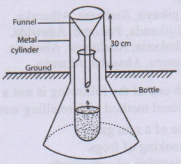
The instrument is used to measure the amount of water- in the atmosphere
- on the ground
- from the rains
- from the plants.
- The diagram below shows the process of formation of a mountain.
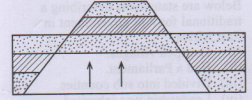
The process is known as- Volcanicity
- Faulting
- Deposition
- Folding.
- Below are some of the leaders in Kenya.
- Masinde Muliro
- Daniel arap Moi
- Oginga Odinga
- Mwai Kibaki
- Tom Mboya
Who among the groups of leaders fought for the re-introduction of multi-party democracy in 1991?- (iii) (v) (ii).
- (iii), (ii), (i)
- (iii), (ii), (iv)
- (i), (iii), (iv)
- Forty youth from Makueni County were employed in the Magadi Soda factory in Kajiado County where they are living. This type of migration is called
- Rural to rural
- Urban to urban
- Rural to urban
- Urban to rural.
- Which one of the following is not true about traditional education in Kenya? It enabled
- one to marry many wives
- one to earn a living
- the youth to become responsible
- the youth to be self reliant.
- Which one of the following pre-historic sites is found in Tanzania?
- Nsongezi.
- Afar Depression.
- Fort Tenan.
- Kalambo.
- Below are statements about a famous traditional leader in Kenya.
- He was a respected medicineman.
- He prophesied the coming of Europeans.
- He felt Europeans would harm the Africans.
- He died in 1904.
The leader described above is- Mekatilili wa Menza
- Koitalel arap Samoei
- Sakawa
- Masaku.
- Which one of the following types of mountain vegetation is found below the bare rock?
- Savannah.
- Bamboo.
- Rain forest.
- Moorland.
- The following are characteristics of an early human being.
- cooked food.
- walked straight and upright.
- kept domestic animals.
- built simple houses.
The early human being described above is- Homo Sapien
- Home Erectus
- Homo Habilis
- Kenyapithecus.
- Which season is experienced in the northern hemisphere in the month of December?
- Winter.
- Summer.
- Autumn.
- Spring.
- Juma, a Class 8 pupil asked his teacher for the meaning of bush fallowing. The teacher's response was that it is
- growing of both food and cash crops
- growing of crops and keeping of livestock
- leaving the land idle to regain fertility before using it again
- moving to a new land after the soil in the present land is exhausted.
- Three of the following are problems facing poultry farming in Kenya. Which one is not?
- Expensive poultry feeds.
- Shortage of land.
- Diseases that kill birds.
- Changes in prices of poultry products.
Use the map of Kenya below to answer questions 25 to 28
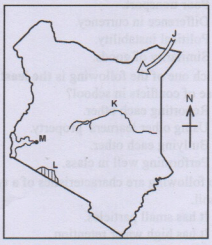
- The language group that migrated into Kenya using the route marked J is
- Nilotes
- Cushites
- Bantu
- Semites.
- The river marked K is
- Ewaso Nyiro North
- Tana
- Galana Sabaki
- Ewaso Nyiro South.
- The game reserve marked L is
- Maasai Mara
- Serengeti
- Tsavo
- Ruma.
- The town marked M is
- Kakamega
- Kisumu
- Eldoret
- Homa Bay.
- Class 7 pupils visited Masinga dam on River Tana for an education tour. One of the pupils asked the tour guide why the dam was built. The guide told them that the main reason why the dam was built was to
- provide a fishing site
- generate hydoelectricity
- provide water for domestic use
- create a recreation centre.
- Jane plans to go to Uganda to sell bananas. Which problem is she likely to face?
- Poor transport.
- Difference in currency.
- Political instability.
- Similarity of goods.
- Which one of the following is the least cause of conflicts in school?
- Reporting each other.
- Using other learners' property.
- Bullying each other.
- Performing well in class.
- The following are characteristics of a type of soil.
- It has small particles.
- It has high water retention.
- It is difficult to plough
- It is dark in colour.
The type of soil described above is- Clay
- Sandy
- Loam
- Alluvial
- Which one of the following is a reason why Lewanika collaborated with the British?
- To get back his land.
- For protection from other European powers.
- For spread of christianity in his Kingdom.
- To stop slave trade.
- Which of the combinations of crops below are grown in horticultural farming? A
- Cabbages, millet, pawpaw.
- Potatoes, beets, bananas.
- Onion, apples, roses.
- Rice, tomatoes, carnations.
- One of the reasons why the Tswana practise nomadic pastoralism is that
- the area receives low rainfall
- they own large herds of livestock
- they have large tracks of land
- they like migrating with animals.
- The main contribution of coffee farming to the economy of Ethiopia is that, it
- earns foreign exchange
- creates employment
- develops infrastructure
- leads to growth of industries.
- Below are some uses of a crop.
- Used to make perfumes.
- Used to make dental medicine
- Used to make soap.
- Used as a flavour in cakes.
The crop described above is- Cocoa
- Cloves
- Onions
- Chillies.
- The main problem facing industries in Kenya is
- limited markets
- inadequate capital
- inadequate skilled labour
- limited raw materials.
- The following are reasons for the establishment of settlement schemes in Kenya except
- to settle the landless
- to reduce population pressure
- to create job opportunities
- to increase food production.
- Who among the following leaders is correctly matched with the resistance group they led
Movement Leader- Hehe Mkwawa
- Mandinka Kabaka Mwanga
- Buganda Mekatilili
- Giriama Samori Toure
- Below are uses of a certain mineral. It is used:
- as food for animals.
- to manufacture soap.
- for domestic purposes.
- to prevent a human disease.
The mineral described above is- diatomite
- fluorspar
- salt
- limestone.
- Which one of the following countries was colonized by France?
- Egypt.
- Angola.
- Morocco.
- Cameroon.
- The following statements describe a type of democracy.
- Citizens elect representatives.
- Elected members make laws.
- Government appoints officials to implement policies.
The type of democracy described above is- indirect democracy
- direct democracy
- civic democracy
- pure democracy.
- Which one of the following is not true about tourism in Kenya?
- Tourism brings many religions to Kenya
- Tourism creates jobs for Kenyans.
- Tourism earns Kenya foreign exchange.
- Tourism promotes international relations.
- Below are some causes of soil erosion.
- High rainfall.
- Monocropping.
- Shifting cultivation.
- Weak soil structure.
- Overstocking.
Which one of the following combinations of causes is as result of human activities?- (i), (ii), (iii).
- (ii), (iii), (v).
- (i), (iii), (iv).
- (i), (iii), (v).
- Domestic tourism refers to the visit of local people
- to another country to preach
- in their own country for pleasure
- in their own country for seminars
- to other countries for pleasure.
- Fatuma, a Standard 8 pupil sees a person being beaten by some people. The best action for her to take is to A
- talk to the people to stop
- run away from the scene
- let the people continue beating the pupil D
- call for help from other people.
- The right to health care is referred to as
- civil right
- social right
- economic right
- environmental right.
- Which one of the following statements is true about fish farming in both Kenya and Japan?
- Fish is sold through co-operatives.
- Fish is the leading export.
- Both have a strong fishing culture.
- Both rear salt and fresh water fish.
- John a Standard 8 pupil found a Grade 4 pupil lying on the floor unconscious. The best action to take is to
- shout for help
- run away from the scene
- report the matter to the teacher
- administer first aid.
- Which one of the following is the role of school management committee?
- Organize relevant teaching materials.
- Maintain cleanliness in the school.
- Plan for development of the school.
- Transfer teachers.
- The following are processing industries except
- Soda ash factory in Magadi
- Milk factory in Naivasha
- Sugar factory in Mumias
- Shoe factory in Limuru.
- Which one of the following practices may lead to drug abuse?
- Using preventive medicine.
- Healthy leisure activities.
- Monitoring use of medicine.
- Selling medicine in shops.
- The following tasks are carried out by people in Kenya.
- Paying taxes.
- Attending religious seminars.
- Participating in elections.
- Taking care of one's property.
- Taking care of the environment.
Which combination of the tasks above consist of responsibilities of a Kenyan citizen?- (i), (iii), (v).
- (iii), (iv), (v).
- (ii), (iii), (v). D
- (i), (iv), (v).
- Three of the following are responsibilities of the United Nations. Which one is not?
- Settling disputes between countries.
- Settling refugees.
- Providing famine relief.
- Discussing internal security.
- Which one of the following philosophies was adopted by the Kenya government at independence?
- Nyayo.
- African socialism.
- Uhuru na kazi.
- Harambee.
- Who among the following nominates Cabinet Secretaries in Kenya? The
- President
- National Assembly
- Senate
- Judiciary. 5
- We show respect to our National Anthem by
- learning it in Kiswahili
- singing it many times
- standing at attention when singing it
- singing it in English and Kiswahili.
- Who among the following is not a member of the County Assembly in Kenya?
- Ward representatives
- Nominated members.
- Youth representatives.
- Deputy Governors.
- The work of Kenya Defence Forces is to
- arrest law breakers
- assist in making laws
- provide protection from external attacks
- provide protection from internal conflicts.
PART II: RELIGIOUS EDUCATION
SECTION A
CHRISTIAN RELIGIOUS EDUCATION
- From the Genesis stories of creation, Adam and Eve were placed in the garden of Eden by God in order to
- be saved from dangerous animals
- till and protect the garden
- name the animals in the garden
- eat the fruits from all the trees in the garden.
- A lesson Christians learn from the incident when Abraham was willing to sacrifice his son Isaac is that they should be
- obedient to God
- honest in their lives
- respectful to other
- joyful when serving God.
- "God has made me a ruler over all Egypt,come to me without delay" (Genesis 45:9). These words said by Joseph to his brothers when he received them in Egypt demonstrate that he
- was planning to enslave them
- was planning to give them leadership positions
- owned a lot of land in Egypt
- had forgiven his brothers.
- Who among the following people was chosen by God to assist Moses to deliver the Israelites from Egypt?
- Caleb.
- Joshua.
- Jethro.
- Aaron.
- "I am who I am" (Exodus 3:14). These words were spoken by God to Moses when he was
- crossing the Red Sea
- receiving the Ten Commandments from God
- performing miracles in Egypt
- being called by God.
- Ruth chose to go with her mother in-law Naomi back to Bethlehem mainly because she
- wanted to visit her relatives in Bethlehem
- hoped to get a husband in Bethlehem
- desired to worship the God of Naomi
- desired to live in a new place with Naomi.
- King David promoted the worship of God in Israel mainly by
- bringing the covenant box to Jerusale
- making sacrifices to God
- preparing materials for the building of the temple in Jerusalem
- singing and dancing for God.
- A lesson Christians learn from the rich woman from Shunem when she built a room for prophet Elisha is that they should
- ask for favours from servants of God
- build places of worship
- give gifts to their friends
- take care of the servants of God.
- Which one of the following statements is a teaching of the new covenant foretold by prophet Jeremiah? God would
- write his laws upon people's hearts
- write the laws on stone tablets
- make the Israelites a kingdom of priests
- make Israel a great nation.
- Which one of the following statements were said by the angel to the women who went to the tomb to anoint the body of Jesus?
- "What are you talking about to each other as you walk along?".
- "Do not be afraid... God has heard your prayer."
- "Go and make the tomb as secure as you can".
- "He is not here, he has risen ".
- Which one of the following statements was said by Simon about baby Jesus when he was presented by his parents for dedication in the temple? He will
- be called the son of the Most High
- be a light to reveal God's will to the Gentiles
- be a great man in the sight of the Lord
- have an everlasting kingdom.
- "The scripture says, worship the Lord your God and serve Him only" (Luke 4:8). These words were said by Jesus
- during the Sermon on the Mount
- when he was sending his disciples on a mission
- when he was being tried before pilate
- during his temptation in the wilderness.
- A lesson Christians learn from the incident in which Jesus told a rich man to sell all he had and give the money to the poor is that they should
- use their wealth to serve others
- seek spiritual wealth
- have limited material possessions
- give all their wealth to the poor.
- A parable of Jesus that shows how different people receive the word of God is the parable of the
- mustard seed
- sower
- three servants
- Good Samaritan.
- The main lesson Christians learn from the incident when Jesus raised Jairus' daughter from death is that they should
- seek help from others
- work for God
- comfort those who have problems
- have faith in God.
- Which one of the following is a reason Jesus was baptized in River Jordan? In order to
- purify himself
- receive the holy spirit
- fulfill the law of Moses
- please John the Baptist.
- A lesson Christians learn from Philip when he explained scriptures to the Ethiopian Eunuch who was on his way from Jerusalem is that they should
- avoid asking questions to strangers
- be led by the Holy Spirit
- travel to different places
- read many books.
- Which one of the following is a reason why deacons were chosen in the early church? To
- be in charge of the distribution of food
- perform miracles in church
- preach the good news
- organize singing in the church.
- "I have no money at all but I will give what I have..." (Acts 3:6). These you words were said by Peter when he was about to
- baptize Cornelius in Caesarea
- heal the lame man at the Beautiful Gate
- raise Tabitha back to life in Joppa
- heal Aeneas in Lydda.
- Which one of the following statements is a teaching from the Apostles' Creed?
- "May your Kingdom come"
- "Forgive us our sins"
- "He ascended into heaven"
- "Happy are pure in heart."
- Which one of the following is a gift of the Holy Spirit?
- Joy.
- Healing.
- Patience
- Self control.
- In traditional African communities but pregnancy is valued mainly because it
- is a time for the expectant mother to receive gifts
- gives the expectant mother time to rest
- is a sign of the arrival of a new member of the community
- provides an opportunity for relatives to visit the expectant mother.
- The main reason why people are encouraged to get married in both traditional African communities and Christianity is in order to
- to raise their status
- have children
- to get wealth
- to get labour.
- In traditional African communities members of a family share duties mainly to
- avoid idleness of some members
- please the ancestors
- develop different talents
- provide for the needs of the family.
- Christians in Kenya should obey those in authority because
- God expects them to do so
- those in authority are powerful
- It is a way of pleasing them
- they will be rewarded for doing so.
- On her way home from school, Joan findssome Grade 3 pupils stealing mangoes from a nearby farm. As a Christian, what is the correct action for Joan to take? She should A
- take the mangoes and return them to the owner of the farm
- stop them from stealing and tell them to respect other people's property
- ask those pupils to give her some of the mangoes
- report the matter to their class teacher.
- Your deskmate, Hellen, tells you that her parents are infected with HIV and she is finding it difficult to care for them. As a Christian what is the best advice to give Hellen? Tell her to
- seek help from the church
- come and stay with you
- go and stay with her relatives
- request the classmates to assist.
- Your deskmate, Brian, tells you that he does not like collecting rubbish because he feels this is manual work. As a Christian what is the correct advice for you to give Brian? Tell him
- the benefits of a clean environment
- to request his parents to transfer him to another school
- to be hiding when others are working
- that you will be doing the work for him.
- You discover that your classmate, Stella, has a habit of taking alcohol during the weekend and she invites you to join her in the habit. What is the correct action for you to take?
- Tell your classmates about it.
- Tell Stella's parents about her behaviour.
- Refuse and tell her the effects of alcohol abuse.
- Refuse and stop talking to her.
- Your friend Carol tells you that her aunt who recently came from another country and is staying with them is showing symptoms of COVID-19. The aunt has refused to isolate herself and therefore Carol fears she might have contracted the virus. What is the best advice for you to give Carol? Tell her to
- Isolate herself and not to share any item with other family members
- go and live with another relative who stays far
- go for a COVID-19 test and encourage her aunt and other family members to do the same.
- request her parents to send her aunt away so that they can be safe.
SECTION B
ISLAMIC RELIGIOUS EDUCATION
- A Surah that promises Prophet Muhammad (P.b.u.h) success in his mission is
- A-Tiin
- At-takathur
- Al-Asr
- An-Nasr
- Omar was giving a talk in class on why Muslims should assist orphans. The Surah he should refer to is
- Al-Lahab
- Al-Inshirah
- Al-Maun
- Al-Fatiha.
- Muslims are urged to pray to Allah andmake sacrifices to Him in Surah
- Al-Kauthar
- Al-Aadiyat
- Al-Ikhlas
- Al-Lahab.
- 'Illa ladhina amanu wa'amilu swalihaat'. This verse is found in Surah
- Al-Humaza
- Al-Asr
- Al-Qadar
- Al-Falaq.
- Muslims are warned against gathering of be wealth in Surah
- Al-Kafirun
- Al-Qariah
- Al-Humaza
- Al-Zilzilah.
- Which among the following is a characteristic of a hypocrite according to the Hadith of the Prophet (P.b.u.h)?
- Takes riba.
- Betrays trust.
- Neglects swalat.
- Disrespects parents.
- Which one of the following is a rule of eating according to the Hadith of the Prophet (P.b.u.h)?
- Eating what is in front of you.
- Saying alhamdulillah when you start eating.
- Saying bismillah when you finish eating.
- Eating food that is good for you.
- Which among the following is not a condition of saum? One must
- be a Muslim
- be mature and sane
- be in the state of wudhu
- make the intention (nia) to fast.
- The tashahud is recited during
- Idd celebrations
- Aqiqah celebrations
- the performance of swalat
- the performance of Hajj.
- During performance of wudhu, Hassan washed the following parts of his body
- feet
- ears
- hands
- face
Which of the above are fardh parts of wudhu?- (ii) (iii) (iv).
- (ii) (i) (iii).
- (i) (ii) (iv).
- (i) (iii) (iv).
- A pilgrim in a state of Ihram is not allowed to
- take a bath
- brush teeth
- use perfume
- eat meat.
- Fatma, a Grade 6 pupil performed a three rakaat sunnah prayer after Isha prayer. Which among the following prayers did she perform?
- Witr.
- Ba'adiya.
- Khusuf.
- Taraweh.
- 'Bismillah' is a phrase used by Muslims when they
- start to do something
- get something good
- face problems in life
- wake up in the morning.
- Your classmate Mariam is disappointed because she did not qualify to join the debate team. What is the best advice that you can give her? Tell her to
- stop participating in debate
- continue participating in debate
- join another club
- concentrate on her studies.
- Jamal your friend tells you that he accidentally took another person's shoes after Dhuhr prayers in the mosque. The correct advise you would give him is that he should ob od live
- throw the shoes away
- donate the shoes to the poor
- keep the shoes and wear them
- take the shoes back to the mosque.
- Which among the following statements is true about the angels of Allah? They
- eat and drink
- received books
- obey the commands of Allah
- obey the teachings of the Prophet.
- Which among the following is the correct order of the last four Prophets of Allah?
- Zakariyah, Issa, Yahya,Muhammad.
- Zakariyah, Yahya, Issa,Muhammad.
- Yahya, Zakariyah, Issa,Muhammad.
- Yahya, Issa, Zakariyah,Muhammad.
- Ali, a Grade 4 pupil has been abusing his classmates and has decided to repent after realising his mistake. Which one of the following attributes of Allah will encourage him to seek for repentance?
- Al-Jabbar.
- Al-Muumin.
- Al-Aziz.
- Al-Rahim.
- The first event of the last day is
- destiny
- judgement
- resurrection
- assembling.
- Which one of the following business practices should be avoided by Muslims
- Charging interest on loans.
- Selling goods on credit.
- Earning profit from goods sold.
- Selling equipment for sports.
- When choosing a friend in your class, you should consider one who is
- quiet
- famous
- rich
- humble.
- A'adhama Ilahu ajrak. This dua is said for
- a bereaved person
- a disabled person
- a dead person
- a sick person.
- The main reason why many Muslims lost their lives during the battle of Uhud is because they
- were few in number and the Quraish were many
- did not follow instructions from the Prophet
- had insufficient weapons
- were overpowered by the enemy.
- Which one of the following events happened in the year of sorrow
- Muslims were expelled from Makka.
- The death of the Prophet (P.b.u.h).
- The death of Lady Khadija and Abu Talib.
- Muslims were prevented from performing Hajj.
- The last sermon of the Prophet was at
- Mount Arafat
- Mount Swafa
- Masjid Quba
- Masjid Nabawi.
- Which among the following activities helped in the spread of Islam along the Coast of Kenya between the 15th and 19th century? A
- building of the Kenya Uganda railway.
- translation of the Quran into Kiswahili.
- intermarriage between the Portuguese and Arabs.
- intermarriage between the Africans and Arabs.
- Which among the following festivals is correctly matched with the month in which it is celebrated?
Festival Month- Idd-ul-Addha Rajab.
- Idd-ul-fitr Shawwal.
- Isra-wal-Miraj Dhulhijja
- Milad-un-Nabi Muharram
- Which among the following months is not among the ash-hurul-hurum?
- Muharram.
- Dhul-Qaada.
- Rajab.
- Ramadhan.
- A common act among all Muslims is
- wearing white garments
- eating with hands
- facing Qibla during Swalat
- breaking fast with dates.
- Who among the following was the son of Nabi Adam?
- Habil.
- Suleiman.
- Yunus.
- Ismail.
SECTION C
HINDU RELIGIOUS EDUCATION
- Which of the following Panch Mahabhoot is correctly matched with its quality?
Panch Mahabhoot Quality- Jala taste
- Agni warmth
- Vayu smell
- Akash touch
- The attribute of Parmatma that is shown in the Sikh greeting, 'Sat sri Akal' is
- Loving
- Knowledgeable
- Powerful
- Eternal.
- Which of the following was done by Lord Vishnu in his Matsya Avatar?
- Saved mankind from destruction.
- Gave moral values to humanity.
- Protected the Divine Knowledge.
- Destroyed Evil. ide-mu-ballM
- The following statements described a Jain Tirthankar:
- He was the 23rd Tirthankar.
- Lord Indra protected him during his meditation.
- He preached Ratna Traya.
- He attained moksha on Samet Shikhar.
The Tirthankar described is- Parshwanath
- Shantinath
- Mallinath
- Neminath.
- Which one of the following was the main achievement of Guru Gobind Singh? He
- defended Hinduism.
- composed the poem 'Chandani Charitra.'
- founded the Khalsa Panth.
- chose Banda Bahadur as his successor.
- Who among the following personalities stopped the practice of animal sacrifice?
- Lord Buddha.
- Shradhanand Swami.
- Vallabhacharya Guru.
- Ramanujacharya.
- The following incidents happened according to the epic Ramayana:
- Rama, Sita and Laxman went to the forest for 14 years.
- Hanuman located Sita in Ashok Vatika.
- Rama and Laxman helped Vishwamitra to kill the evil beings in his ashram and neighbouring land.
- Rama killed Ravan.
- Rama broke the bow of Parshuram.
The correct order of the incidents is:- v, i, iv, ii, iii
- i, ii, iii, iv, v
- ii, i, v, iii, iv
- iii, v, i, ii, iv.
- During which of the holy days is Kalpasutra read?
- Navratri.
- Paryushan.
- Diwali.
- Holi.
- Purusharth is a Hindu principle that encourages devotees mainly to
- satisfy desires
- follow ethics and morals
- make an honest living
- attain self-enlightenment.
- The following are the teachings of Guru Nanak except
- earn honestly
- practise penance
- pray sincerely
- help the needy.
- Ajay, a standard 8 pupil, gets angry easily. His parents advised him to practise the principle of
- Akrothe
- Ahimsa
- Sheel
- Satya
- Which one of the following principles of Dharma is correctly matched with its practice?
Principle Practice- Dharma Self-control
- Dama Honesty
- Dhruti Patience
- Asteya Sincerity
- The principle that guides a person towards attainment of moksha is
- Asteya
- Kshama
- Vidya
- Shaucham.
- The best way to achieve mental purity is through
- studying scriptures
- meditation practised regularly
- visiting places of worship
- listening to religious discourses.
- Which of the following ceremonies is performed by a Sikh devotee?
- Nishkraman.
- Upanayan.
- Chudakarma.
- Amrit Chakhna.
- The first Sanskar performed after a Hindu baby is born is
- Jatkarma
- Namkarna
- Chudakarma
- Nishkarman.
- The Buddhist devotees offer prayers in their place of worship which is known as
- Derasar
- Stupa
- Gurudwara
- Mandir.
- Which of the following is a place of pilgrimage which is important to devotees of Lord Vishnu and Lord Buddha?
- Abu.
- Palitana.
- Bodhi Gaya.
- Kashi.
- A unique common feature which is performed for celebrating festivals in Sikhism is
- fireworks
- sprinkling of colours
- playing raas and garba
- langar.
- Which one of the following is performed for the ustav of Navratri?
- Installing the Garbo in the venue.
- Burning the effigy of Ravan.
- Lighting a bonfire.
- Having a funfair.
- Which utsav is celebrated for a personality who taught Hindus to keep their promise at any cost?
- Janmashtmi.
- Ram Navmi.
- Shivratri.
- Holi.
- Who among the following yogis practised karma yoga?
- Bhagirath, Nivedita.
- Tulsidas, Surdas.
- Raja Janak, Nachiketa.
- Ramdas, Chandanbala.
- The following are the steps for performing a yogasana:
- Lying on the ground face up.
- Relaxing every part of the body.
- Removing tension and thoughts.
- Staying still with eyes closed.
- Being still for a few minutes.
- Turn on the side and get into a sitting position.
The asana described above is- Vajrasan
- Padmasan
- Shavasan
- Shalbhasan.
- Raja Janak was given the knowledge of attaining moksha by sage
- Vashishta
- Yagnavalkaya
- Changadeva
- Ashtavakra.
- Sumaira noticed that some of the neighbours have been scattering litter all over the compound. The best action for Sumaira to take is to
- dispose off the litter and ignore them
- sensitize the neighbours on the importance of proper litter disposal
- complain to the caretaker about the issue
- tell her parents what the neighbours are doing.
- Vivek, a Standard 8 pupil has a parent who was infected by COVID-19 and has been in the hospital for a long time. The class teacher and his class mates raised the funds to pay part of the hospital bill. The sadachar demonstrated by their action is
- tolerance
- obedience
- respect
- compassion.
- Your friend, Paras, has been spending a lot of his time playing computer games and his performance in school is dropping drastically. What is the correct advice for you to give Paras?
- Tell him to balance his study time withplay time.
- Ask him to give you his computer games.
- Tell him to seek for advice from other classmates.
- Request him to transfer to a different school.
- The best way for Grade 6 pupils to demonstrate care for the environment is by
- sweeping their classroom
- dusting the bookshelf
- planting trees
- keeping the grass short.
- Hindus pay tribute to their ancestors and departed souls of their family members in the month of
- Kartik
- Bhadrapad
- Chaitra
- Falgun.
- Who among the following is worshipped on Nirjala Ekadashi?
- Lord Buddha.
- Lord Rama.
- Lord Vishnu.
- Lord Hanuman.
Science Questions - KCPE 2023 Past Papers
- Which one of the following types of teeth in human beings is not shed?
- Premolars.
- Incisors.
- Molars.
- Canines.
- In which one of the following pairs of partsbof the human body does digestion of food take place?
- Liver and stomach.
- Stomach and mouth.
- Pancreas and small intestine.
- Large intestine and mouth.
- During breathing in, the following happens to air as it passes through the nose except being
- warmed
- moistened
- cleaned
- absorbed.
- The following diagram represents a certain blood cell in human beings.
The function of the blood cell is to- transport oxygen
- clot blood
- fight germs
- transport food.
- Which one of the following excretory products is produced by the skin, lungs and the kidney?
- Salt.
- Carbon IV oxide.
- Water.
- Urea.
- The following are control measures for HIV and AIDS except
- immunization
- counselling and testing
- educating masses
- media advertisement.
- The main reason why one should go for HIV testing is
- to know one's HIV status
- to stop spreading of HIV
- for an infected person to live positively
- for one to seek treatment.
- The following are signs and symptoms of a certain communicable disease:
- Chest pain;
- Loss of weight;
- General body weakness;
- Prolonged coughing.
The disease can best be prevented through- proper ventilation
- clearing bushes
- proper nutrition
- giving vaccination.
- Which one of the following practices is dangerous when handling chemicals at home?
- Storing chemicals in bottles.
- Following instructions on the container.
- Smelling chemicals to identify them.
- Using protective equipment
- The following are some signs and symptoms of sexually transmitted infections:
- painful urination;
- painless chancre;
- rush on the body;
- smelly pus from the genitals.
Which two are for syphilis?- (i) and (iii).
- (i) and (iv).
- (ii) and (iii).
- (ii) and (iv).
- Which one of the following diseases is in the immunisation schedule for infants?
- Herpes.
- Malaria.
- Diphtheria.
- Chancroid.
- Healthy teeth can be maintained by
- eating sugary foods
- using teeth to open bottles
- eating vegetables and fruits
- cleaning teeth before breakfast.
- Which one of the following plants store food in the stem?
- Sweet potato.
- Irish potato.
- Cassava.
- Carrots.
- The following is a representation of a food chain.
Grass → Grasshopper → Guinea fowl → Eagle
The secondary consumer is- eagle
- grasshopper
- grass
- guinea fowl.
- Which one of the following adaptations enable plants to survive in wet areas?
- Presence of thin cuticle.
- Presence of needle like leaves.
- Deep roots.
- Succulent stems.
- An example of a plant that obtains food nutrients from insects is
- mango
- cactus
- acacia
- sundew.
- Which two of the following are oil crops?
- Maize and barley.
- Coconut and maize.
- Cotton and barley.
- Coconut and millet.
- Pupils assembled the following materials to construct a certain weather instrument:
- A glass bottle;
- Ink;
- Biro pen tube;
- Water;
- Manilla paper;
- Cellotape.
The weather instrument constructed was a- windvane
- rain gauge
- liquid thermometer
- wind sock.
- In the solar system, the fourth planet from the sun is
- Mars
- Uranus
- Jupiter
- Earth.
- The following are characteristics of a certain animal:
- lays eggs;
- breathes using lungs;
- has a moist skin;
- undergoes external fertilization.
The animal described is most likely to be a- lizard
- bat
- fish
- frog.
- Which one of the following animal feeds is classified as pasture?
- Lucerne.
- Sorghum.
- Hay.
- Oats.
- Which one of the following is an internal parasite?
- Tsetse fly.
- Round worm.
- Jigger.
- Mite.
- An example of a bird that feeds on grains is
- eagle
- dove
- duck
- sun bird.
- Which one of the following is not a way of using water sparingly?
- Using a watering can.
- Repairing leaking pipes.
- Using drip irrigation.
- Turning off taps.
- One of the disadvantages of hard water is that it forms fur in kettles which
- prevents convection of heat
- acts as an insulation
- makes the kettle rusty
- increases evaporation
- Which one of the following is a way of conserving water by reusing?
- Harvesting rain water.
- Cleaning the house with tap water.
- Watering plants with treated sewage water.
- Washing coffee berries using borehole water.
- The disease that can be controlled by draining stagnant water is
- bilharzia
- cholera
- typhoid
- dysentery.
- The following are some effects of soil erosion:
- Small holes on the ground;
- Thin top layer of soil missing;
- V-shaped trenches on the ground;
- Small and shallow channels on the ground.
Which two effects are for gulley and sheet erosion?
Gulley Sheet- iv iii
- iii ii
- i iii
- iii iv
- Which one of the following takes the shortest time to release nutrients into the soil?
- Mulches.
- Farmyard manure.
- Green manure.
- Compost manure.
- The following observations were made on different types of soil:
- Spreads easily;
- Good for construction;
- Makes long ribbons;
- Good for farming;
- Has good drainage.
Which observations are correctly matched to sand and clay soils?
Sand Clay- (i) (v)
- (ii) (iv)
- (i) (iii)
- (iii) (iv)
- A child was diagnosed with the following signs and symptoms:
- wrinkled face;
- wasted body muscles;
- general body weakness;
- crying a lot.
The child's condition can be corrected by providing adequate food that is- rich in iron
- a balanced diet
- rich in proteins
- rich in vitamins.
- Which one of the following pairs of food preservation methods is correctly matched as modern and traditional?
Modern Traditional- Smoking Use of low temperature
- Canning Drying
- Salting Smoking
- Use of low temperature Use of honey
- Which one of the following can cause food poisoning?
- Micro-organism.
- Excess spices.
- Excess cooking oil.
- Less fibre in food.
- Which one of the following pairs consist only of sources of chemical energy?
- Firewood and dynamo.
- Dynamo and sun.
- Firewood and battery.
- Sun and battery.
- The following diagram represents an improved jiko.
Which one of the following parts labelled
N, P, Q and R minimizes heat loss?- N
- P
- Q
- R
- In an experiment to investigate good and bad conductors of electricity, different materials were used and observations made. Which one of the following was likely to be a correct observation?
Material Observation- Pin bulb lights
- Glass bulb lights
- Nail bulb does not light
- Coin bulb does not light
- The following diagram represents a setup that can be used to demonstrate a certain aspect of light.
The aspect investigated is- refraction of light
- dispersion of light
- reflection of light
- how light ttravels
- In which one of the following pairs of materials is heat transferred through convection only?
- Glass and water.
- Iron rod and glass.
- Air and iron rod.
- Air and water.
- Which one of the following is not a special sound? Sound from a
- siren
- crying child
- ringing bell
- scream.
- The following are some of the ways used to light a house:
- electric bulbs;
- translucent roofs;
- windows;
- lamps.
The natural ways of lighting a house are- (i) and (ii)
- (ii) and (iii)
- (ii) and (iv)
- (iii) and (iv).
- The following are uses of a certain component of air:
- making plant food;
- preserving soft drinks;
- putting out fires.
The air component is- oxygen
- carbon dioxide
- nitrogen
- inert gases.
- Which one of the following pair of liquids are miscible?
- Water and kerosene.
- Cooking oil and milk.
- Water and cooking oil.
- Cooking oil and kerosene.
- A certain form of matter has the following characteristics:
- occupies space;
- has definite mass;
- has definite volume;
- has definite shape.
The characteristics are likely to be for- solids and gases
- gases only
- solids only
- gases and liquids.
- Which one of the following material sinks L in water?
- Office pin.
- Wooden ruler.
- Plastic plate.
- Candle wax.
- Which one of the following pairs of levers has the fulcrum between the load and effort?
- Spade and wheelbarrow.
- Wheelbarrow and crowbar.
- Crowbar and claw hammer.
- Spade and claw hammer.
- Friction is an advantage when
- closing a door
- swimming
- sharpening a knife
- flying.
- In a single fixed pulley, the effort used is
- almost equal to the load
- less than the load
- twice the load
- in the same direction as the load.
- Which one of the following can pollute soil, water and air?
- Spilt oil.
- Aerosal sprays.
- Industrial gas emissions.
- Burning of tyres.
- The main purpose of mulching is to
- control soil erosion
- conserve soil moisture
- kill weeds by suffocation
- add humus to the soil. no dow
- Which one of the following statements correctly describes the term environment?
- Home of a living thing.
- Surrounding of a living organism.
- Daily changes of the atmosphere.
- Interdependence between living things.
Kiswahili Questions - KCPE 2023 Past Papers
Soma vifungu vifuatavyo. Vina nafasi 1 mpaka 15. Kwa kila nafasi umepewa majibu manne. Chagua jibu lifaalo zaidi kati ya yale uliyopewa.
Dereva mwangalifu ___1___ kuwa amezingatia sheria za barabarani. ___2___ magari ___3___ yanatakiwa kutimiza kanuni mbalimbali ili yakubaliwe kutoa huduma___4___ usafiri. Madereva wanapaswa___5___ ___6___ magari hayo. Abiria nao wasinyamaze katu madereva___7___ utaratibu ufaao. Ili kuepuka maafa ___8___kila mmoja atahadhari kwani ___9___.
| A | B | C | D | |
| 1. | huhakikishia | huhakikisha | huhakishiwa | huhakikishiana |
| 2. | Maadamu | Lau | Mathalani | Japo |
| 3. | sote | zote | mote | yote |
| 4. | za | kwa | mwa | wa |
| 5. | kukaa tutwe | kukaaa doria | kukaa ange | kukaa tayari |
| 6. | wanavyoyaendesha | wanapoyaendesha | wanakoyaendesha | wanazoyaendesha |
| 7. | wakikiuka | wangekiuka | wamekiuka | wakakiuka |
| 8. | inatubidi | inakubidi | inawabidi | inambidi |
| 9. | mwenye macho haambiwi tazama. | kinga ni bora kuliko tiba. | hakuna marefu yasiyo na ncha. | usilolijua ni usuku wa kiza. |
Mchezo ___10___ wa kabumbu yaani wa ___11___ huchezwa kote ulimwenguni. Ni mchezo ___12___ tija kwa ___13___ taifa lake. Huchukua dakika tisini.___14___ timu zinazocheza hazijafungana bao, huongezewa muda wa___15___ kupata mshindi.
| A | B | C | D | |
| 10. | maarufu | stadi | hodari | bingwa |
| 11. | soka | voliboli | vikapu | raga |
| 12. | kwenye | wenye | penye | mwenye |
| 13. | analochezea | anayochezea | anayechezea | anakochezea |
| 14. | Hadi | Ingawa | Hata | Iwapo |
| 15. | kiasi | halafu | ziada | awali |
Kutoka swali la 16 mpaka 30, chagua jibu sahihi.
- Nomino zilizopigiwa mstari katika sentensi ifuatayo ni za aina gani?
Rembo alinunuliwa manukato katokana na usafi wake.- wingi, dhahania
- kawaida, pekee
- dhahania, kawaida
- pekee, wingi.
- Chagua wingi wa sentensi ifuatayo.
Daktari aliyemtibu ametuzwa na shirika hilo.- Madaktari waliomtibu wametuzwa na mashirika hayo.
- Madaktari waliowatibu wametuzwa na mashirika hayo.
- Madaktari waliowatibu wametuzwa na shirika hilo.
- Madaktari waliomtibu ametuzwa na shirika hilo.
- Matumizi ya -po- katika sentensi ifuatayo ni:
Mwema alipofika tuchezeapo, alimpata katibu wa chama chetu.- mahali, wakati
- wakati, mahali
- mazoea, masharti
- masharti, mazoea.
- Chagua sentensi yenye kivumishi cha pekee.
- Mkulima atawafuga ng'ombe wale shambani mwake.
- Mwanafunzi amenunua vitabu vinne vya Kiswahili.
- Hatibu mwenyewe aliwashauri vijana kuhusu masomo.
- Mvuvi ambaye anasifika sana anaitwa Pato.
- Sarafu huanguka sakafuni tang! ilhali moto huzimika:
- pu!
- ndi!
- fyu!
- zii!
- Ni sentensi ipi inayoonyesha kuwa tukio moja linategemea lingine?
- Tina alimpikia chakula kitamu akafurahi.
- Balo angali analima tangu asubuhi.
- Tesi na bintiye wameamua kwenda sokoni.
- Mose alikuwa ameibuka mshindi katika uogeleaji.
- Matumizi ya kwa katika sentensi ifuatayo.
'Kanusu alisoma kwa bidii akapata themanini kwa mia,' ni:- jinsi, sehemu ya kitu kizima.
- sababu, sehemu ya kitu kizima.
- umilikaji, sehemu ya kitu kizima.
- kulinganisha, sehemu ya kitu kizima.
- Chagua jibu lisilo sahihi.
- chura kiluwiluwi
- njiwa-kipura
- kipepeo - kisuse
- papa - kinengwe.
- Chagua jibu lifaalo kujaza pengo katika sentensi ifuatayo.
_____________ nitamwona, nitampasha habari hizo.- Bali
- Ikiwa
- Angaa
- Halafu
- Safari yangu itaanza siku ya tatu baada ya jana. Je, itaanza lini?
- Mtondo.
- Mtondogoo.
- Kesho.
- Kijoto.
- Chagua usemi wa taarifa wa:
"Mkifika mapema mtauwahi mkutano." Karani alisema.- Karani alisema kuwa wangefika mapema watauwahi mkutano.
- Karani alisema kuwa wakifika mapema, watauwahi mkutano.
- Karani alisema kuwa wangefika mapema wangewahi mkutano.
- Karani alisema kuwa wakifika mapema wangewahi mkutano.
- Ni sentensi ipi iliyoakifishwa ifaavyo?
- Fisi na Sungura ni maadui Sana.
- Fatuma amepika; Chapati, Biriani na kaukau.
- "Karibuni nyumbani wanangu," mama aliwaomba.
- ng'ombe, mbuzi na kondoo watachinjwa leo.
- Sentensi, "Asingalichora vyema, asingalituzwa," ina maana:
- Hakuchora vyema, akatuzwa.
- Alichora vyema, akatuzwa
- Hakuchora vyema, hakutuzwa.
- Alichora vyema, hakutuzwa.
- Chagua jibu lenye nomino za ngeli ya U-U
- uyoga, wema, wizi
- waya, wali, uzi
- uso, ukuta, ugali
- werevu, uji, wino.
- Akisami, 7/9 kwa maneno ni:
- tusui saba
- tusui tisa
- subui tisa
- subui saba.
Soma kifungu kifuatacho kisha ujibu maswali 31 mpaka 40.
Je umewahi kutafakari kuhusu neno mazingira? Ni neno ambalo daima limekuwa vinywani mwa waja. Mazingira ni ile hali au mambo yanayozunguka mtu mahali anapoishi; nchi kavu, angani na hata majini. Manufaa atakayopata binadamu yanategemea namna anavyoyatunza mazingira yake.
Fikiria vile hali ingekuwa bila mito, miti, maziwa, milima, mabonde na hewa safi! Yakini, hali ingekuwa si hali. Tuchukue kwa mfano mito na maziwa, faida zake ni chungu nzima. Maji tunayoyatumia nyumbani, kupikia, kufulia na kunyweshea mifugo na kwa unadhifu wa binadamu hutoka pale. Aidha, shughuli nyingi za viwandani huhitaji maji kwa wingi. Wakulima nao wanafaidika kwa kuwa wanayatumia maji kunyunyizia mimea yao.
Isitoshe, miti ina tija kubwa kwa jamii. Hutumiwa katika ujenzi, kutengeneza dawa, kutupatia chakula na kama hifadhi ya wanyama na ndege. Vilevile, miti huvuta mvua, husafisha hewa na kuzuia mmomonyoko wa udongo na kurembesha mazingira. Ukataji miti kiholela hum- nyima binadamu faida hizi.
Ni dhahiri kwamba mazingira ni uhai na hatuna budi kuyatunza. Mathalan tuyaondoe maji yaliyotuama kwenye vidimbwi kisha tuvizibe. Vyombo vingine kama vile mikebe na vigae ambavyo vimetapakaa nje huweza kuhifadhi maji kunyeshapo na kutuama hivyo kuwa mahali pa mbu kuzalia. Endapo hatutachukua hatua hii, mbu wanaweza kuzaliana humo na kusababisha malaria. Hali kadhalika watu wanaweza kuyanywa na kuambukizwa uwele wa waba. Hatari hizi zinaweza kuzuiwa kwa kutia kemikali kwenye maji hayo ili kuwaangamiza viluwiluwi waliomo. Vyombo ambavyo vinaweza kuweka maji yasiyohitajika visitupwe ovyoovyo.
Hewa safi ni muhimu kwa maisha ya binadamu. Hewa hii inaweza kuharibiwa na moshi utokao kwenye magari mabovu na pia viwandani. Kutokana na uchafuzi wa hewa, uhai wa bi- nadamu huhatarishwa kwani huenda akapatwa na magonjwa anuwai yakiwemo pumu, saratani kifua kikuu na hata yale ya ngozi. Aidha, uchafuzi wa hewa huwa na athari kwa hali ya anga. Kwa mfano safu ya ozoni ikiharibiwa, joto jingi hutokea na huweza kuathiri afya ya binadamu na wanyama. Misimu na majira pia hubadilika jambo ambalo huweza kuathiri kilimo na miundo misingi. Ili kukabiliana na janga hili, magari mabovu yanayotoa moshi mwingi yakarabatiwe au kuondolewa barabarani. Wenye viwanda wanastahili kubuni mikakati kabambe ili kudhibiti gesi na majitaka yatokanayo na shughuli za kuzalisha bidhaa.
Mazingira ya nyumbani nayo ni muhimu. Tunafaa kuyatunza kulihali kwani tusipotahadhari tutajilaumu wenyewe. Mabaki ya chakula husababisha uvundo katika nyumba zetu yasipohifad- hiwa vizuri. Zaidi ya hayo, picha tuipatayo katika baadhi ya nyumba inachukiza. Utapata taka zimeenea kote; si maji machafu, si maganda ya ndizi na parachichi, si kaka za mayai, si karatasi na matunda yaliyooza na kuozeana. Ni nani mwingine atakuja kudumisha usafi wa nyumba zetu ila sisi wenyewe? Hatari inayotukodolea macho ni kubwa. Kuna uwezekano kuwa umewahi kuteleza na kuanguka kutokana na kukanyaga ganda la ndizi lililotupwa shelabela. Wa kulaumiwa ni nani? Wahenga walig'onga ndipo waliposema mwiba wa kujichoma hauambiwi pole. Kila mmoja katika familia ana jukumu la kuhakikisha kwamba taka zote za nyumbani zimetupwa kwenye jalala.
Ni wazi kuwa mazingira ni a hidaya ambayo tunapaswa kuithamini lau sivyo tutakuwa chachandu anayejipalia makaa.
- Kwa mujibu wa aya ya kwanza:
- Watu wengi hupendezwa na mazingira yao.
- Mazingira hutawaliwa na hali kavu.
- Anga inaweza kuyaboresha maisha ya binadamu.
- Binadamu atafaidika akiyazingatia yaliyomo katika maeneo anamoishi.
- Aya ya pili imedhihirisha kuwa:
- Maji yana faida zaidi nyumbani kuliko mahali pengine.
- Maisha ya binadamu yatakuwa magumu bila mazingira.
- Kilimo hakihitaji maji mengi kama uzalishaji bidhaa.
- Maziwa yana manufaa mengi zaidi yakilinganishwa na milima.
- Jibu lisilo sahihi kuhusu miti kwa mujibu wa aya ya tatu ni:
- Chombo cha kusafisha hewa na kuchangamsha viumbe.
- Kiungo cha tiba na huwalisha binadamu.
- Pambo la mazingira na hukinga udongo usisombwe.
- Chanzo cha mvua na ni makazi ya viumbe.
- Aya ya nne imebainisha kuwa lazima tuyatunze mazingira ili
- tuepuke kunywa maji machafu.
- tukwepe kutupa toka ovyo.
- tuzuie mbu kuongezeka.
- tuwe na siha njema.
- Kwa mujibu wa kifungu:
- Mbu hupendezwa na maeneo yoyote yaliyo na maji.
- Maji yaliyotiwa dawa hutibu magonjwa yaletwayo na mbu.
- Uharibifu wa hali ya anga huweza kuvuruga shughuli za ukulima.
- Mabadiliko ya hali ya anga huchangia kuwepo kwa hewa safi.
- Jukumu la wenye viwanda katika utunzaji mazingira kulingana na aya ya tano ni:
- Kudhibiti mvuke utokanao na mitambo itumikayo viwandani.
- Kuimarisha harakati za kuzalisha bidhaa za viwandani.
- Kuzua njia zifaazo za kukabiliana na vichafuzi votakavyo viwandani.
- Kushirikiana na wenye magari makuu kuu kuzuia moshi kuchafua mazingira.
- Ni jibu lipi ambalo si ushauri kwa mujibu wa aya ya sita.
- Ni wajibu wa kila mja kunadhifisha mahali anakoishi.
- Chakula kilichosalia kinastahili kutunzwa kwa njia ifaayo.
- Uchafu hutapakaa kote katika baadhi ya nyumba.
- Majaala ya kutupia taka yanapaswa kuwekwa kila mahali.
- Maana ya kauli 'miti ina tija kubwa' ni:
Miti ina- gharama kuu.
- mvuto mkubwa.
- tiba nyingi.
- manufaa mengi.
- Chagua maana ya methali, "Mwiba wa kujichoma hauambiwi pole" kwa mujibu wa kifungu.
- Ukiweka maji machafu nyumbani mwako utajisababishia madhara mengi.
- Ukieneza kaka za mayai na karatasi usitarajie kuhurumiwa.
- Ukitupa taka ovyo hufai kusaidiwa upatapo hasara.
- Ukikanyaga maganda ya matunda utajiumiza wewe mwenyewe.
- Kauli "tutakuwa chachandu anayejipalia makaa' imetumia tamathali gani ya usemi?
- sitiari.
- methali.
- nahau.
- tashbihi.
Soma kifungu kifuatacho kisha ujibu maswali 41 mpaka 50.
"Ngomeni washuke! Ngomeni washuke!"Sauti ya utingo ilihanikiza kote kuwahimiza abiria ambao walikuwa wamejaa pomoni kwenye daladala hii kushuka. Sauti hii ndiyo iliyoniamsha kwenye usingizi mzito. Sikujua nilikuwa nimelala kwa muda gani. Nililokumbuka ni kwamba mara tu baada ya kuhakikisha kwamba nimekihifadhi kirununu changu kibindoni, usingizi uliniiba, nikalala bila hata kuwazia kwamba nilikuwa mwana genzi wa safari. Licha ya kwamba hii ndiyo iliyokuwa mara yangu ya kwanza kuondoka nyumbani peke yangu, ilikuwa pia mara yangu ya kwanza kwenda jijini. Hakika jiji la Tugawane nilikuwa nasikia habari kulihusu ama kutoka kwa marafiki wangu wachache waliobahatika kuwa na jamaa huko, au kupitia magazeti ambayo hayakuchelewa kuandika visa vya kuchangamsha, kushangaza na kuhuzunisha kuhusu jiji hili.
"Ndugu, umelala sana," alisema abiria aliyekuwa ameketi karibu nami, akanitazama tena kisha akaendelea, "Unaenda wapi huku Tugawane? Naona tunakaribia kufika kituo cha mwisho. Hawa wakishuka, tunastahili kujitayarisha kwani tukifika kwenye kituo cha mabasi cha Hamaniko sote tutahitajika kushuka".
Maneno ya abiria mwenzangu yalinitanabahisha kwamba kwa kweli sikujua nilikokuwa naelekea. Sikujua kwa sababu baba yangu aliniambia tu kwamba ami yangu angenipokea huko kituoni. Sikuona haja ya kukumbuka jina la mtaa nilikokuwa naenda kwani baba aliniandikia nambari ya ami, nikaihifadhi kwenye kirununu changu, japo kwa kweli alinitajia jina lenyewe. Nilijua kwamba ningempata ami kituoni na kama ningechelewa, ningempigia simu.
"Sijui ninakoenda," nilimwambia abiria mwenzangu; ami yangu atakuja kunipokea kituoni. Kesho atanipeleka chuoni, Mwenge." Abiria mwenzangu aliniangalia akatikisa kichwa kisha akanitazama tena kana kwamba ananiambia, "Utafungaje safari bila kujua uendako kisha unalala? Naona ubwabwa wa shingo haujakutoka. Nakuhurumia kwa yatakayokupata."
Hatimaye gari lilipunguza mwendo na kupinda kuelekea kituo cha Hamaniko. Kibarabara kilichoelekea huko, kilikuwa kimeshiba kikatapika. Si maelfu ya magari, na rukwama zilizosheheni mizigo ya wachuuzi wa vyakula, si matusi ya mahamali waliotaka kupishwa, si wauzaji wa vipande vya matunda vilivyofungwa kwa karatasi za plastiki... Hata sauti nene ya utingo ilipotangaza, "Shukeni haraka! Tulikuwa tumechukua saa mbili ushei kusafiri masafa ya kilomita tano tu. Mara tu utingo alipotoa tangazo abiria mwenzangu alikurupuka na kushuka haraka bila kunipa hata kwaheri. Niliinuka nikaingiza kiganja changu kibindoni ambamo nilikuwa nimekihifadhi kirununu changu. "Mungu wangu!" Nilisema kwa sauti ya jitimai iliyomshtua hata utingo. "Nini kijana?" Aliuliza utingo. "Sioni rununu yangu," nilimwambia huku nikizuia kilio. "Humo ndimo nilimokuwa nimehifadhi nambari ya simu ya ami yangu. Ami anakuja kunipokea kituoni," Nilimweleza utingo zaidi.
"Basi wewe shuka. Utamsubiri ami yako huko kwenye ubao huo," alisema kisha akajiondokea bila hata kuniuliza kama namjua mwingine yeyote katika jiji hili.
"Maskini ami asipokuja sijui nitafanya nini," nilijisemea, "Kumbe, mwenzangu huyu alijua aliyotenda? Kumbe ndiyo maana akaondoka bila kunijulia la heri wala la shari?"
- Kulingana na aya ya kwanza:
- Msimulizi alikumbuka alikuwa na kirununu onda kibindoni aliposikia sauti ya utingo ikitangaza washuke.
- Utingo alizungumza kwa sauti nzito ili msimulizi na abiria wasikie aliyosema.
- Hii ndiyo mara ya kwanza kwa msimulizi kusikia habari za yale yanayoendelea mjini.
- Baadhi ya habari alizo nazo msimulizi kuhusu Tugawane zinatoka kwenye vyombo vya habari.
- Aya ya kwanza imeonyesha kwamba:
- Utingo wa daladala za Tugawane walikuwa na mazoea ya kujaza abiria.
- Abiria alilala kwa sababu mizigo yake ilikuwa salama kwenye gari.
- Awali msimulizi alikuwa akiandamana na jamaa kila mara alipotoka nyumbani.
- Ngomeni kulikuwa na watu waliowahuzunisha na kuwashangaza wengine kwa maneno yao.
- Chagua jibu sahihi kulingana na kifungu.
- Abiria mwenzake msimulizi alimwamsha ili msimulizi ajue anakoenda.
- Kituo cha mabasi cha Hamaniko kilikuwa hatua chache kutoka Ngomeni.
- Baba ya msimulizi alikuwa amemtajia mahali ambapo alikuwa anaenda.
- Rununu ilihifadhiwa kibindoni kwani ilikuwa inahitajika mwishoni mwa safari.
- Msimulizi amekosa uwajibikaji kwani:
- Alimwambia mwenzake anakoishi bila kuwaza kuwa ni mgeni kwake.
- Alipuuza maelekezo aliyopewa na baba yake kwa kutegemea kirununu.
- Alitarajia kufika chuoni Mwenge bila kujua njia ya huko.
- Alisahau kwamba alikuwa ameketi kando ya abiria ambaye alihitaji simu.
- Kauli, 'Utafungaje safari bila kujua uendako kisha unalala?" inaonyesha hasa kwamba abiria
- anamhuzunikia msimulizi kwa kushikwa na usingizi.
- anamlaumu msimulizi kwa kukosa makini.
- anamtahadharisha msimulizi kuhusu hatari ya safari za ugenini.
- anachukizwa na ukosefu wa kumbukumbu ya msimulizi.
- Chagua matatizo yanayoukumba mji wa Tugawane kwa mujibu wa aya ya tano.
- Wachuuzi wengi, ukosefu wa heshima.
- Kelele nyingi, wizi kituoni.
- Uchafuzi wa mazingira, msongamano wa magari.
- Barabara zenye mashimo, ukatili garini.
- Ushirikiano wa kifamilia unahimizwa katika kifungu kwani:
- Baba aliandika nambari ya simu kumtambulisha msimulizi.
- Baba alijua kwamba msimulizi akipoteza simu ami atamngojea Ngomeni amwelekeze.
- Ami alifahamu kwamba msimulizi atampigia simu gari likichelewa ili tampokee.
- Ami alichukua nafasi ya baba ya kumpeleka msimulizi Chuoni.
- Kulingana na kifungu, utingo
- alikosa kutilia maanani hali ambayo ingemkumba msimulizi.
- alijua kwamba abiria alikuwa mwizi.
- alichukizwa na kelele ya msimulizi.
- alifahamu mahali ambapo ami huwangojea wageni wake.
- Kauli, "Maskini, ami asipokuja sijui nitafanya nini; inamaanisha kwamba msimulizi
- anajihurumia kwa yale ambayo yatamfika.
- anashangazwa na kuchelewa kwa ami yake.
- anajilaumu kwa kuzungumza na abiria mwenzake.
- anasikitishwa na mazingira mageni mjini.
- Chagua kisawe cha, 'ilihanikiza' kulingana na kifungu.
- Ilisikilizwa
- Ilitangazwa
- Ilienea
- Ilivutia.
INSHA
Umepewa dakika 40 kuanndika insha yako.
Andika insha itakayomalizika kwa maneno yafuatayo.
Ni wazi kuwa kufanikiwa kwangu maishani kulitokana na ushirikiano huo.
English Questions - KCPE 2023 Past Papers
Questions 1 to 15
Read the passage below. It contains blank spaces numbered 1 to 15. For each blank space, choose the best alternative from the choices given.
Good management of waste is important for a clean environment. When waste is not disposed of ___1___, it can affect human health ___2___ damage the environment. For instance, waste that is carelessly dumped has led to ___3___ of water sources, bad smell and an increase___4___ disease vectors, pests and scavengers. ___5___ some types of waste do not need to be thrown away. They___6___ be recycled. For example, waste paper can be ___7___ to a factory to make toilet paper. Other materials that can be recycled ___8___ plastics, glass and metals.enl
In some communities, there are organisations that ___ 9___ environmental awareness. They do this by ___10___ providing households with garbage bags. The households use these bags to put in the rubbish from ___11___ houses. These organisations also give the youth the ___12___of ensuring that they pick ___13___ garbage and ferry it to ___14___ collection points. This type of activity trains the youth to be ___15___members of society.
| A | B | C | D | |
| 1. | speedily | properly | directly | nicely |
| 2. | and | but | also | even |
| 3. | lack | wastage | decrease | pollution |
| 4. | in | to | on | by |
| 5. | Moreover | Therefore | However | Besides |
| 6. | might | will | can | shall |
| 7. | sold | stored | removed | collected |
| 8. | include | example | again | thus |
| 9. | guide | direct | assist | promote |
| 10. | regularly | quickly | politely | carefully |
| 11. | our | these | their | those |
| 12 | task | favour | choice | power |
| 13. | a | the | some | any |
| 14. | few | other | opposite | different |
| 15. | humble | generous | responsible | obedient |
For questions 16 to 19, choose the best alternative to fill in the blank space.
- When my father fell sick, he _________________ in bed for five days.
- lay
- laid
- lied
- lain
- Juma was congratulated __________________ passing his examination.
- for
- on
- at
- over
- Sarah ____________________ a story to entertain us at breaktime.
- put out
- made up
- gave up
- brought out
- Our class prefect will __________________ from his position at the end of the term.
- step down
- take down
- get down
- put down
For question 20, choose the best arrangement of the given sentences to make a sensible paragraph.
-
- We dug holes in our school compound.
- We made a fence around each seedling.
- We planted and watered the seedlings.
- It was a tree planting day.
- (iv) (ii) (i) (iii)
- (iv) (i) (iii) (ii)
- (i) (iv) (ii) (iii)
- (i) (iii) (iv) (ii)
For questions 21 and 22, choose the alternative that means the same as the underlined sentence.
- Unless it rains. I will not plant beans.
- I will not plant beans when it rains.
- I will plant beans because it rains.
- I will not plant beans after it rains.
- I will only plant beans if it rains.
- The person who repairs shoes has gone home.
- The repairer has gone home.
- The mender has gone home.
- The cobbler has gone home.
- The monger has gone home.
Read the passage below and then answer questions 23 to 25.
Dan, Leah, Asha and Shem are pupils at Akili Primary School. They take part in different activities during the holidays. Dan grows potatoes and maize. Leah grows potatoes and keeps dairy cattle. Asha grows potatoes and maize. Shem and Dan keep poultry and sheep.
- Which activity is the least practised by the pupils?
- Poultry farming.
- Dairy farming.
- Crop farming,
- Sheep farming.
- Which two pupils would get mutton and eggs from their farming?
- Leah and Shem.
- Dan and Asha.
- Leah and Dan.
- Dan and Shem.
- Which statement is true according to the passage?
- Only one pupil grows maize.
- Three pupils keep poultry.
- Dan does most activities.
- Shem keeps sheep and grows maize.
Read the passage below and then answer questions 26 to 38.
Jeremy lived with his parents in Kongoni village. His father was a peasant farmer who owned a tiny piece of land. Each year, he planted maize and beans on this farm but the family did not have enough to eat. Jeremy's mother moulded pots and weaved baskets to sell at the local market. However, these did not fetch the family much money.
Jeremy was a very clever boy and his father was proud of him. He constantly got very good grades and was top of his class. What his teachers did not know was that Jeremy was always tired and hungry by the time he reached school. He had to walk ten kilometres to school every day. In the evening, he would walk back home and arrive when it was nearly dark. His mother would ask him to look after the younger children while she cooked supper.
One morning, Jeremy's mother was not feeling well. She sent him to fetch some firewood. This would make him late for school. He was worried that he would miss the first lesson.
As soon as he dropped the bundle of firewood in the house, Jeremy hurriedly left for school. On the way, he had to cross a narrow wooden bridge. Some of the wood appeared rotten and could fall into the river any time. So, Jeremy walked across the bridge carefully. Suddenly, he heard a splash and a scream from behind. He turned and saw a small child clinging onto a piece of timber. Jeremy wasted no time. He dived into the river. It was very cold. He felt the current carry him along. He swam hard against it and soon reached the child. He held out his hand and the child clung to him. Jeremy swam to the river bank with the little boy in his arms.
Soon a crowd gathered at the river bank. Among them was a smartly dressed lady.
"You are a brave young man". She said. The overjoyed lady led the two boys to her home. She gave them clothes to change. She told Jeremy, "Don't worry. I will accompany you to school and explain to your teacher why you are late." The lady was pleased with Jeremy's heroic act and gave him a brand new bicycle and promised to pay his school fees when he joined secondary school the following year. Jeremy was grateful and very excited. is
(Adapted from Safari Children's Book 2 (1973) JKF, Nairobi.)
- Which one of the following is true about Jeremy's family?
- They were proud.
- They were not wealthy.
- They were generous.
- They were not hardworking.
- According to the passage, Jeremy's father was proud of him because Jeremy
- worked very hard at school.
- helped his parents at home.
- saved the boy at the river.
- sold pots and baskets at the market.
- The word "clinging" as used in passage means
- holding.
- touching.
- floating.
- pushing.
- Why was Jeremy always hungry when he reached school?
- His family had many members.
- He was given work during supper time.
- The farm did not produce anything.
- The family did not have enough food.
- "Top of his class" as used in the passage means;
- Jeremy was a leader in his class.
- Jeremy performed best in his class.
- Jeremy was doing everything in his class.
- Jeremy was sitting in front of his class.
- Why was Jeremy worried?
- He would be late for class.
- His mother was unwell.
- He would be punished.
- His friends would laugh at him.
- Why did Jeremy rush to school?
- He had to cross a narrow bridge.
- He wanted to save the little boy.
- He wanted to attend the first lesson.
- He had already brought the firewood.
- Why did Jeremy walk carefully across the bridge?
- He was tired.
- It was weak.
- It was made of wood.
- He was afraid of the river.
- From the passage, we can say that the small child
- was in great danger.
- was the smart lady's child.
- wanted to swim in the river.
- went to the same school as Jeremy.
- Which one of the following is not true about the passage?
- Jeremy's mother was a businesswoman.
- Jeremy was always late for school.
- Jeremy knew how to swim.
- Jeremy's teachers did not know him well.
- From the passage, we can say that the smartly dressed lady is
- clever and brave.
- wise and patient.
- generous and thankful.
- curious and talkative.
- Which one of the following statements is true according to the passage?
- Jeremy knew the smartly dressed lady.
- Jeremy fetched firewood every day.
- Jeremy was in final year in primary school.
- Jeremy did not take care of his sick mother.
- Which one of the following is the most important lesson we learn from this passage?
- We should always dress smartly.
- We should always help those in need.
- We should walk carefully across bridges.
- We should work hard in school.
Read the following passage and then answer questions 39 to 50.
There are many sources of natural energy. They include wind, water and the sun. Energy from the sun is called solar energy. This type of energy is renewable. This means that it naturally replaces itself as it is being used. It therefore does not get finished. Solar energy is also plentiful. In fact, in only about 12 minutes, enough solar energy reaches the surface of the earth to supply the entire world with energy.
However, solar energy is not available all the time. It is not available at night. Clouds can also block out some of it. Nevertheless, when there is sunlight, solar energy can be conserved and used later. Moreover, when the sunlight strikes walls of buildings, solar energy is absorbed and stored. During the night, as outdoor temperatures fall, the stored energy is released slowly making the rooms warm.
A device called solar collector can be used to heat water for washing clothes, washing dishes and bathing. Water heated this way can also be stored in a tank to warm indoor air by releasing the heat. Unfortunately, this method of heating water is not used very much because the collector cannot store enough energy required to heat a large amount of water.
Another way of heating water is by using a solar furnace. The method can be used to heat water to temperatures high enough to produce steam. The steam can be used to generate electricity. So far, very few solar furnaces are being used because they are very expensive to build.
All in all, the sun remains one of the most available sources of energy. Therefore, energy experts hope to make better use of solar energy in the future.
(Adapted from Science Probe (Second Ed.) 1993 by John Wiley & Sons, Canada.)
- According to the first paragraph, we can say that the sun
- is the only natural source of energy.
- produces energy that can be used over and over again.
- has better energy than wind and water.
- takes exactly 12 minutes to reach the earth.
- Renewable energy is one which is
- used completely.
- found everywhere.
- always there.
- rarely replaced.
- From the passage, we can tell that solar energy is mostly available
- at night.
- at sunrise.
- when it is cloudy.
- when the sky is clear.
- What happens when sunlight reaches a house?
- Outdoor temperatures reduce.
- The walls become much better.
- Energy from the sun is blocked.
- Solar energy is stored in the walls.
- The word "device" as used in the passage means the same as
- method.
- equipment.
- way.
- plan.
- According to the passage, rooms can be made warm by
- hot water kept in a tank.
- making houses strong.
- the use of a solar furnace.
- building many water collectors.
- Which one of the following statements is trueabout a solar collector?
- It is used to store hot water.
- It is used to wash different things.
- It is not common.
- It is not expensive.
- The word generate as used in the passage means the same as
- produce.
- control.
- carry.
- light.
- From the passage, which of the following is arranged in the correct order?
- solar furnace; producing steam; generating electricity; heating water. B
- heating water; solar furnace; producing steam; generating electricity.
- solar furnace; heating water; producing steam; generating electricity.
- heating water; producing steam; generating electricity; solar furnace.
- From the passage, we can tell that energy experts are
- patient.
- powerful.
- energetic.
- hopeful.
- In future, the use of solar energy will
- possibly improve.
- be the only one left.
- attract more experts.
- be cheaper.
- Which one of the following would be the most suitable title for this passage?
- Getting energy from the sun.
- Types of renewable energy.
- Storage of solar energy.
- Uses of natural energy.
Mathematics Questions - KCPE 2023 Past Papers
- What is three million forty eight thousand two hundred and fifty seven written in numerals?
- 30482 7
- 3408257
- 3480257
- 3084257
- What is the place value of 7 in the number 9843.071?
- Tens
- Tenths
- Hundredths
- Hundreds
- What is the next number in the pattern shown below?
3/4, 11/4, 13/4, 21/4, _______.- 11/8
- 12/3
- 23/4
- 31/4
- What is 3/8 as a percentage?
- 121/2
- 183/4
- 361/2
- 371/2
- Charity cycled from home to school a distance of 12 kilometres. She started the journey at 7.20 a.m and arrived at 8.00 a.m. What was her speed in metres per second?
- 2.5
- 5
- 10
- 18
- The figure below shows a trapezium UWXY. Line YX is parallel to line UW. The perpendicular distance between the parallel lines is 12 cm and line YX = 18 cm. The area of the trapezium is 252 cm2.
What is the length of line UW?- 16 cm
- 18 cm
- 24 cm
- 39 cm
- A teacher shared pencils among his learners. The girls received 2/3 of the pencils and the boys received 5/6 of the remainder. The
teacher remained with 8 pencils. How many pencils did the teacher have before sharing?- 40
- 96
- 136
- 144
- A school received five thousand and forty two books. The books were delivered in two lorries. The first lorry had three thousand and sixteen books. How many books were in the second lorry?
- 2026
- 2036
- 7068
- 8058
- What is the value of
1/2 of (2/3 − 1/6) ÷ 11/4?- 1/3
- 1/5
- 2/15
- 5/16
- Cylindrical tins each of diameter 20 cm and a height of 15 cm were packed in a carton. The carton measured 120 cm long, 80 cm wide and 30 cm high. How many tins were packed in the carton?
- 61
- 48
- 24
- 12
- What is the value of 16.8×0.0542 ?
0.072- 0.0126
- 1.26
- 12.6
- 126
- A scale drawing of a rectangular plot of land measures 3 cm by 2 cm. The scale used is 1:2000. What is the actual area of the plot in ares?
- 24000
- 2400
- 240
- 24
- What is the value of x in the equation
2x/3 − 4x/9 = 12?- 54
- 104/5
- 101/2
- 9
- What is 567432 rounded off to the nearest ten thousands?
- 560000
- 567000
- 570000
- 600000
- Three bells ring at intervals of 12 minutes, 24 minutes and 36 minutes. They rang together at 10.00 a.m. When was the last time they rang together before 10.00 a.m?
- 8.48 a.m
- 8.48 p.m
- 11.12 a.m
- 11.12 p.m
- The area of a semicircle is 39.25 cm2. What is the length of the diameter? (Тakе л = 3.14)
- 25 cm
- 10 cm
- 6 cm
- 5 cm
- A pupil reported to a boarding school on 27th January, 2019. He went for a mid-term break on 18th March 2019. How many nights did he spend in school?
- 49
- 50
- 51
- 52
- The area of a square plot of land is 0.0576 hectares. The plot was fenced all round using five strands of wire. What was the total length of the wire used?
- 480 m
- 192 m
- 96 m
- 24 m
- A pipe has a diameter of 0.7 m and a length of 3 m. The outer surface of the pipe was painted. What was the area that was painted?
(Таkе л = 22/7)- 13.2 m2
- 10.4 m2
- 6.6 m2
- 2.2 m2
- What is the value of 4n2(r + y) + ny when n = 2, r = 3 and y = 5
r + y − n- 101/2
- 121/3
- 23
- 138
- A printing press produced 11457 books on Monday. It produced 308 more books on Tuesday than on Monday. On Wednesday, it produced 4796 less books than the total number produced both on Monday and Tuesday. How many books were produced in the three days?
- 16561
- 18426
- 23222
- 41648
- A cylindrical container has a diameter of 56 cm and a height of 30 cm. The container is half filled with water. How many litres of water are in the container? Тakе л = 22/7
- 258.72
- 147.84
- 73.92
- 36.96
- Construct triangle PQR such that line PQ = 10 cm and angle RPQ = angle RQP = 40°. Construct a circle that touches the vertices P, Q and R. What is the measure of the diameter of the circle?
- 10 cm
- 5 cm
- 3.6 cm
- 1.8 cm
- A van is loaded with 120 cartons each containing 40 packets of salt. The mass of each empty carton is 500 g and that of each packet of salt is 750 g. What is the total mass of the load in kilograms?
- 36600
- 3660
- 3600
- 3540
- Kelvin deposited sh 15 000 in a bank. The bank paid compound interest at the rate of 12% per annum. What was the total interest paid by the bank at the end of two years?
- sh 18 816
- sh 3 816
- sh 3 600
- sh 2016
- Ntimama had 40 cows and 55 goats in his farm. He sold 10% of the cows and increased the number of goats by 20%. What was the new number of animals in the farm?
- 110
- 106
- 102
- 80
- The area of a right angled triangle is 54cm2. The length of one of the shorter sides is 12cm. What is the perimeter of the triangle?
- 15 cm
- 21 cm
- 36 cm
- 42 cm
- A saleslady earns a basic salary of sh 10 500 per month. She also earns a commission on sales above sh 100 000. In one month, she sold items worth sh 150 000 and earned a total of sh 18 000. What was the percentage commission?
- 5
- 7
- 12
- 15
- A rectangular floor measures 7.5 m long and 2.5 m wide. The floor is covered with square tiles of side 0.5 m. How many tiles were used to cover the floor completely?
- 112
- 75
- 38
- 28
- What is the value of
7(32 + 4) − 5 x 8 ÷ 2 + 6?- 77
- 56
- 53
- 35
- The following figure shows a triangle drawn inside a semicircle.
What is the area of the shaded part in cm2? (Take π = 22/7 )- 775.25
- 481.25
- 294.00
- 187.25
- What is the square of 61/4?
- 1561/4
- 391/16
- 361/16
- 21/2
- A family uses 30 decilitres of milk everyday. How many litres of milk did they use during the months of February and March 2016?
- 186
- 183
- 180
- 177
- A cuboid measures 6 cm long, 5 cm wide and 4 cm high. What is the total length of the edges?
- 30
- 60
- 90
- 120
- The cash price of a sewing machine is sh 24 800. The hire purchase price is 15% more than the cash price. Joseph purchased the machine on hire purchase terms. He paid a deposit of sh 8 520 and ten equal monthly instalments. How much was the monthly instalment?
- sh 20 000
- sh 2 852
- sh 2 480
- sh 2 000
- The average mass of 36 pupils is 45 kg. The average mass of the pupils together with their teacher is 46 kg. How much more is the mass of the teacher than the average mass of the pupils?
- 127 kg
- 82 kg
- 37 kg
- 36 kg
- The marked price of a bag of beans was sh 4 500. A school bought eight bags of beans at a total cost of sh 34 400. What was the total discount allowed?
- sh 200
- sh 1 600
- sh 4 300
- sh 4 700
- A trader bought 10 crates of soda at sh 600 per crate. He paid sh 30 per crate for transportation. Each crate of soda contained 24 bottles but ten bottles broke during transportation. He later sold each bottle of soda for sh 30. What percentage profit did the trader make?
- 20
- 142/7
- 10
- 911/21
- A poultry farmer bought the following items:
2 chick feeders @sh 85
5 bags of chick mash @sh 450
4 bags of growers mash @sh 650
2 packets of chick formula for sh 150
She paid for the items using 6 one thousand shilling notes. How much balance did she get?- sh 680
- sh 830
- sh 4 665
- sh 5 170
- In the figure shown, lines RS and TU are parallel. Line VW is a transversal.
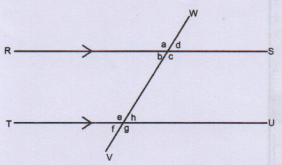
Which one of the following statements is correct?- Angle a = Angle f
- Angle (c+e) = 180°
- Angle (g+d) = 180°
- Angle (d+h) = Angle (a+e)
- Juma bought a pair of trousers for sh r. He also bought a pair of shoes for twice the price of a pair of trousers and a shirt for half the price of the pair of trousers. He paid using two sh x notes. Which one of the following expressions represents the balance Juma got?
- x − 31/2r
- 2x − 31/2r
- 2x + 31/2r
- x + 2 − 31/2r
- The following pie chart shows sales made by a farmer in a certain day.
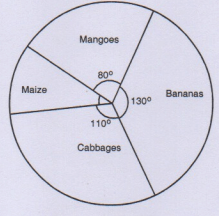
The value of the sales for maize was sh 880. What was the value of the sales for bananas?- sh 1760
- sh 2 420
- sh 2 860
- sh 7 920
- Which one of the following statements is correct about all right angled triangles?
- Two sides are equal
- Two angles are right angles
- The largest angle is 90°
- The longest side is opposite the smallest angle
- Eighteen men working at the same rate can complete a job in 30 days. How many more men, working at the same rate can complete the same job in 12 days?
- 15
- 27
- 33
- 45
- The following are properties of quadrilaterals.
- all sides are equal
- opposite angles are equal
- all angles are equal
- diagonals bisect each other
Which one of the properties is true for a rhombus?- (ii), (iii), (iv)
- (i), (ii), (iii)
- (i), (iii), (iv)
- (i), (ii), (iv)
- Which one of the following statements is correct?
- 0.45 > 48%
- 1/4 < 0.2
- 3/4 = 0.85
- 0.36 > 7/20
- Construct triangle PQR such that line PQ = 8 cm, angle RPQ = 45° and angle PRQ = 75°. Construct a perpendicular line from point R to meet line PQ at M. What is the measure of line RM?
- 2.9 cm
- 5.0 cm
- 5.9 cm
- 7.2 cm
- The following table shows a timetable for a certain aeroplane plying from Airport S to Airport V.
A passenger arrived at Airport T at 1.30 p.m.. How long did the passenger have to wait to depart from the airport?Airport Arrival time Departure time S
T
U
V
1450h
1610h
1805h1400h
1510h
1620h- 20 minutes
- 30 minutes
- 1 hour 20 minutes
- 1 hour 40 minutes
- Brenda has x books. Amina has thrice as many books as Brenda. Juma has 10 books less than the total number of books both Brenda and Amina have. They have a total of 86 books altogether. Which one of the following equations can be used to find the number of books Brenda has?
- 8x − 10 = 86
- 8x + 10 = 86
- 4x + 10 = 86
- 4x − 4 = 86
- The bar graph below shows the amount of milk, in litres, a farmer got from his farm in one week.
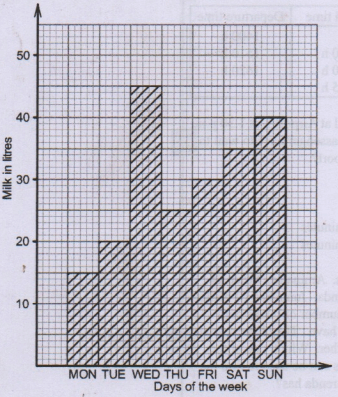
Which two days following each other in the week had the highest total production of milk?- Tuesday and Wednesday
- Wednesday and Thursday
- Wednesday and Sunday
- Saturday and Sunday
Creative Arts and Social Studies Questions - Grade 6 KPSEA 2023 Exams
PART I
- Study the drawings and choose one that shows correct overlapping.
- Which of the following would best describe a still life composition?
- People sitting still.
- Still trees on a calm day.
- Buildings and street lights.
- Calabash, gourd, pot.
- Why is it necessary to wash a fountain pen when you change to a different colour of ink?
- To make the pen clean.
- To make the ink clear.
- To avoid blocking the pen.
- To avoid mixing ink colours.
- A learner is to weave the item shown in the picture.
Identify the technique to be used.- Twine
- Plaiting
- Plain weave
- Coil and stitch.
- The picture below is a pot made using the coil technique.
Which of the following is the best way of joining the coils?- Using slip.
- Using pallets.
- Using glue.
- Pressing well.
- The following statements highlight ways in which plastic bottles can be reused. Which one does not?
- Making toys.
- Decorating places.
- Using them to water flowers.
- Keeping them in the river bank.
- The picture shows a wristband made from leather.
Identify the technique used to decorate it.- Thonging.
- Beading.
- Stitching.
- Gluing.
- The following statements describe how puppets are given character during performance.
Which one does not?- Create a voice
- Make movements
- Increase size of the theatre
- Use different clothes and jewellery.
- A Grade 6 learner has come across an interesting artwork. Which would be the correct way of using the artwork?
- Copy and trace the artwork.
- Edit the artwork and use it.
- Seek permission from the artist.
- Take a photograph when no one is watching.
- Learners at Barara primary school plan to exhibit and sell their artwork during the Open Day. Which strategy will not be effective for marketing their artwork?
- Join the school's art club.
- Post pictures of artwork on sale on social media.
- Announce and invite the community for the exhibition.
- Create posters to advertise sale of the artwork.
- Which of the following is not a component of a folk dance?
- Costumes.
- Body movement.
- Songs.
- Cheering
- The following statements describe how folk songs are performed. Which one is not correct?
- Performed observing safety.
- Performed observing good manners.
- Performed with coordinated body movements.
- Performed using sharp props.
- Which of the following statements does not describe the correct way of singing?
- Singing the tune accurately.
- Pronouncing the words clearly.
- Singing while talking.
- Using facial expressions.
- Grade 6 learners collected the following tools and materials:
Hollow tube, knife, tin, nails, wooden bars, feathers, paint and ruler.
Which of the materials and tools can be used to make a flute?- Hollow tube, nails, feathers and knife.
- Hollow tube, knife, nails and ruler.
- Hollow tube, wooden bars, paint and nails.
- Hollow tube, ruler, nails and feathers.
- Atieno has finished playing her fiddle during a prize-giving ceremony. Which of the following statements, best describes what she should do with the fiddle?
- Wash it with water.
- Keep it outside under the sun.
- Hang it on the wall.
- Put it on the floor.
- Which of the following rhythmic patterns best fits the text given below:
Njoo twende uwanjani - Which of the following words best describes how a lullaby should be sang?
- Loudly and softly.
- Softly and sadly.
- Slowly and softly.
- Fast and softly.
- The following are some practices observed when handling a musical instrument:
- Return the instrument in its case after use.
- Put the parts together correctly before use.
- Wipe moisture from the instrument after use.
- Wash the mouth piece with warm soapy water
- Clean the instrument with warm soapy water.
- Wipe the instrument using a damp cloth.
Which of the practices are hygiene measures observed after playing the descant recorder?- (vi), (iv), (ii) and (i).
- (iii), (iv), (v) and (i).
- (ii), (iii), (vi) and (i).
- (v), (vi), (iv) and (ii).
- Juma's string instrument is not producing the desired sound. What should he do to the instrument?
- He should clean the instrument.
- He should warm the instrument.
- He should get another instrument.
- He should tune the instrument.
- The following are diagrams of two Kenyan indigenous musical instruments.
Which statement is true about musical instruments (i) and (ii)?- Instrument (i) is played by bowing while instrument (ii) is played by hitting.
- Instrument (i) is tuned by adjusting knobs while instrument (ii) is tuned by warming.
- Instrument (i) is a percussion instrument while instrument (ii) is a string instrument.
- Instrument (i) cannot play a melody while instrument (ii) can play a melody.
- Which one of the following group of elements are elements of weather?
- Temperature, snow, rain.
- Wind, temperature, air pressure.
- Sunshine, fog, temperature.
- Temperature, snow, air pressure.
- During a class field trip, Grade 6 learners observed some relief features on their way. Which one of the following diagrams represents a relief feature observed?
- The following is a structure representing some parts of a town.
Which direction is the Health Centre from the Railway Station?- North
- South
- East
- West
- The tropical rainforest vegetation is found in areas that receive high rainfall. In which region is the vegetation found in Eastern Africa?
- Northern region of Sudan.
- Western region of Kenya.
- Northern region of Uganda.
- Southern region of Tanzania.
- A Grade 6 teacher has invited a resource person to discuss about the semi desert climate in Eastern Africa. Which of the characteristics is true about the climate?
- It receives high rainfall.
- It experiences high humidity.
- It experiences high temperatures.
- It receives rain in the afternoon.
- The Social Studies teacher has asked the Grade 6 learners to use the map of Kenya to locate the national parks.
Which one of the following national parks did they find in Mandera County.- Sibiloi
- Amboseli
- Kora
- Malka Mari
- Grade 5 learners were asked to use digital devices to search for communities that belong to the Nilotes of Kenya. Which combination of communities could they have found?
- Abagusii and Somali.
- Luo and Akamba.
- Maasai and Turkana .
- Nubians and Pokomo.
- Kota observed her grandmother making a pot then made her own pot. The method of learning used by Kota is
- Narration
- Apprenticeship
- Discussion
- Riddles.
- Gala primary school is planning to hold elections of the Children's Government. The Grade 4 learners have been asked to discuss functions of the Children's Government in school. Which one of the functions is not correct?
- It speaks on behalf of the learners to the school administration.
- It ensures that the learning environment is friendly
- It assists teachers to ensure learners follow the school rules.
- It ensures teachers report for duty early.
- John had acquired Kenyan citizenship by registration but has received a letter cancelling it. What could have caused the citizenship to be cancelled?
- Voting during the general election.
- Attending a local harambee meeting
- Joining a political party.
- Using false documents.
- Grade 5 learners plan to go for an educational tour to a nearby national park. Which means of transport are they likely to use while in the park?
- Bus
- Train
- Lorry
- Motorcycles.
- Your teacher has asked you to walk around the school compound to collect samples of natural resources. Which of the samples below are you likely to collect?
- Bottles
- Tools
- Posters
- Soils.
- Grade 5 learners of Mamboleo primary school visited a nearby demonstration farm. The farm manager told them that subsistence farming is different from small scale farming in that;
- small scale farmers keep large herds of animals while subsistence farmers grow food crops
- subsistence faming is done on small farms while small scale farming is done on large farms.
- small scale farmers grow cash srops and food crops while subsistence farmers grow food crops.
- subsistence farmers use simple tools while small scale farmers use machinery.
- Mzee Hekima was invited to talk to Grade 4 learners on African Traditional leaders. Which qualities of a good leader is he likely to have discussed? The leader should be a
- good dancer
- prophet
- storyteller
- courageous person.
- Grade 5 learners were asked to identify the symbols of national unity. Which one the following is not a symbol national unity?
- Language
- Flag
- National Anthem
- Public seal.
PART II
SECTION A:
CHRISTIAN RELIGIOUS EDUCATION
- Your teacher tells you to be planting trees in the school. The main reason for this practice is to
- avoid living in a dusty compound
- ensure learners are busy.
- conserve the school environment.
- utilize the water in the school.
- Which of one the following is an appropriate activity to engage in during your leisure time?
- Doing physical exercises.
- Sitting by the roadside.
- Attending disco parties.
- Participating in betting games.
- Members of the family can help to promote unity at home by
- reporting those who do not work
- sharing duties among themselves
- inviting their friends to help them to do the work
- giving gifts to those who work hard.
- Grade 5 learners were told a story on how baby Moses was saved by Pharaoh's daughter. Which value did they learn from the story?
- Holiness.
- Kindness.
- Peace.
- Loyalty.
- A CRE teacher asked pupils to group the books of the Bible according to the Old and New Testaments. Select the box that contains only the books of the New Testament.
- Which of the following commandments teaches you to be content with what you have?
- Do not worship any other God.
- Do not desire another man's property.
- Do not commit adultery.
- Do not accuse anyone falsely.
- After reading the miracle of the healing of the woman who had the flow of blood, your teacher asked you to give a reason why the woman touched the edge of the garment of Jesus. Select the correct answer from the choices given.
- She loved the garment of Jesus.
- She touched it by mistake.
- She was told by the disciple to do so.
- She had faith that she would be healed.
- The main lesson from the parable of the friend at midnight is that we should O
- provide help to our friends
- welcome visitors in our homes
- be persistent in prayer
- lock our doors at night.
- Jesus performed different miracles during his ministry on earth for different reasons. A miracle of Jesus that encourages Christians to be thankful is the miracle of
- healing the Ten Lepers
- healing the Roman Officer's servant
- turning water into wine
- calming the storm.
- The story of the Rich Man and Lazarus teaches Christians to use their money for
- organising parties for friends
- buying food for poor people
- buying clothes for themselves
- travelling to different places.
- Which command did Jesus give to his disciples during the Last Supper?
- Do this in memory of me.
- Go and heal the sick.
- Do not take a purse for yourself.
- Bless those who curse you.
- What value do Christians learn from the story of Ananias and Sapphira of the Early Church?
- Tolerance.
- Mercy
- Perseverance
- Honesty
- On your way to school, a stranger offers you a lift. What is the best action for you to take?
- Accept the lift and get into the car.
- Refuse and go back home.
- Refuse and continue walking to school.
- Hide in the bush until the vehicle goes away.
- Your school prefect has assigned pupils various duties to perform before the lessons begin.
Which one of the following statements represent the correct reason why you should cooperate with the school prefect?- To avoid being punished.
- To obtain good things from the prefect.
- To promote respect for authority.
- To be recognized by the teachers.
- Social media is one of the quickest ways of communication in the world today. Which one of the following activities would be the best use of social media by Grade 6 pupils?
- Chatting with friends all the time.
- Exchanging messages in their learning areas.
- Taking and posting their pictures.
- Watching all kinds of videos.
SECTION B:
ISLAMIC RELIGIOUS EDUCATION
- During the PPI lesson, Aisha talked to a group of learners affected by famine and drought. She encouraged them not to lose hope as Allah would provide for them. The surah she can refer to while encouraging them is
- Al-Quraish
- Al-Kauthar
- Al-Humaza
- At-Takathur
- Grade 6 learners were presented with three verses from surah Al-Qariah and asked to arrange them in their correct order.
- Wa maa adraaka mal qariah
- Wa takunul jibalu kal i'inil
- Yaumu yakunu nnassu kal farashil mabthuth.
The correct order of the verses is- iii, i, îi
- iii, ii, i
- i, ii, iii
- i, iii, ii.
- Imam Abubakar was invited to school to talk about surah Al-Masad. One lesson learned from the surah is that
- Allah will reward those who perform good deeds.
- Wealth cannot protect a person from Allah's punishment
- Muslims should seek protection from Allah.
- Muslims should ask for forgiveness from Allah
- During the Environmental Day, Grade 6 learners participated in different activities.
- cleaning the market
- cleaning the school compound
- planting trees
- conserving the soil
Which of the activities is considered as charity according to the Hadith of the Prophet (p.b.u.h)?- i
- ii
- iii
- iv
- According to the hadith of the Prophet (p.b.u.h), Grade 4 learners can practice responsible living by
- wearing clean clothes
- following school rules
- assisting other learners when they have problems
- sharing what they learned in school with their friends in Madrasa.
- Haytham has been having a lot of difficulties at home. The virtue he can practise from the Ulul-Azm prophets is
- Justice
- Honesty
- Patience
- Kindness.
- Choose the box that contains the pillars of Iman that are correctly arranged.
- When is witr prayer performed?
- Before dhuhr prayer.
- Before Asr prayer
- After fajr prayer.
- After isha prayer
- Grade 6 learners participated in a quiz where they were asked to mention the categories of people exempted from fasting
The learner who gave the correct answer is- Samira - sick, old and blind
- Sheikha - sick, old and traveller
- Maimuna- sick, traveller and blind
- Jamila - sick, traveller and women.
- When Mahmoud performs wudhu, he uses a lot of water unnecessarily. This act is known as
- Tawakkul
- Taqwa
- Israf
- Ihsan.
- The box that contains intoxicants only is
- Amira, the class secretary asks for bribes from her classmates so as not to include them in the list of noise makers. The value that Amira lacks is
- Responsibility
- Integrity
- Love
- Unity.
- During the Parents' Day, Grade 5 learners presented a poem on obligations of parents. One obligation that the Grade 5 parents should fulfil towards their children is
- buying them gifts
- playing with them
- doing homework for them
- Protecting them against harm.
- The experience of the Prophet (p.b.u.h) during the first revelation teaches learners that they should
- trust in Allah
- pray to Allah
- Observe fast
- give zakat.
- The value that learners can learn from the way the Answar helped the Muhajirun in the story of the Hijra to Madina is
- unity
- peace
- integrity
- patriotism.
SECTION C:
HINDU RELIGIOUS EDUCATION
- Which one of the following birds is associated with Lord Krishna?
- Peacock.
- Dove.
- Swan.
- Eagle.
- Grade 4 learners were told by their teacher to research on the deities and their roles. Which one of the deities given below is associated with creation?
- Vishnu.
- Shiv.
- Brahma.
- Ganesh.
- Jayna went to visit Ayodhaya during Diwali. However, she discovered there is a Jain Tirthankar, whose birth is also associated with Ayodhya, the Jain tirthankara is
- Mahavir
- Abhinandannath
- Mallinath
- Neminath.
- The following statements describe an Enlightened Being:
- He is seated on the carriage in the battlefield in Kurukshetra;
- He is very devoted to an Avatar of Lord Vishnu;
- He has supernatural powers;
- He protects the good.
Who among the following Enlightened Beings is described above?- Bishma.
- Dashrath.
- Dronacharya.
- Hanuman.
- Animals are considered sacred creation which should not be killed. The Scripture that talks about the preservation of the animals is
- Ramayan
- Shikshapatri
- Dhammapada
- Bhagwad Gita.
- The head priest in the temple which Manisha visits daily recites the Scripture in Sanskrit. The priest tells Manisha that he recites the Scripture in Sanskrit because
- in translating into vernacular, the inner meaning is lost
- the rythm of recitratioon gives pleasure to listeners
- will motivates people to learn Sanskrit
- Sanskrit is easier than the vernacular.
- The prayer shown below belongs to
- Sanatan
- Jains
- Sikhs
- Buddhists.
- Dhwaj is a prominent feature in places of worship that is hoisted on top of it to
- beautify the place of worship
- helps devotees identify the faith
- gives importance to the faith's symbol
- It gives direction to the devotees.
- Anil failed to perform well in his PHE assessment task. When he approached the teacher for assistance, he was told to practice the principle of ____________________ to pass his examination.
- Punarjanam
- Purushartha
- Pranidaya
- Pvarthana
- A teacher of HRE organized a class presentation on how morning chanting is done in a place of worship. The Sikh principle that guides the chanting is
- Kirat Karna
- Wand shakna
- Naam Japna
- Sewa karna.
- The image of an elephant at the entrance of Jain derasa symbolises
- loyalty
- taming of wildlife
- a symbol for removing negative energy
- a symbol of protection of the temple.
- Mohini is invited by her friend Jinita to the Mandir associated with an Avatar of Lord Vishnu for some prayers. Which of the following greetings is Mohini most likely to hear?
- Jai Ambe.
- Jai Shri Krishna.
- Jai Jinendra.
- Jai Bhole Nath.
- During a PHE lesson, Amrit fell down and hurt his leg. Hanjit stopped playing immediately and took Amrit for first aid. The value that was demonstrated by Hanjit is
- respect
- responsibility
- patience
- tolerance.
- Which two of the Utsavs, celebrate the victory of good over evil?
- Paryushan Parv and Vasant Panchami.
- Navratri and Janamashtami.
- Diwali and Holi.
- Ramnavmi and Gurupurab.
- The head teacher encouraged the learners to practice Yoga every morning. The main reason for practicing Yoga is to
- participate in sports
- enhance social cohesion
- grow spiritually
- be physically fit.
Integrated Science Questions - Grade 6 KPSEA 2023 Exams
- During a lesson, Grade 6 learners discussed functions of different parts of a plant. Which part of a plant is responsible for making plant food?
- Root.
- Stem
- Fruit.
- Leaf.
- The following diagrams were drawn by learners to represent two types of root systems E and F.
Which one of the following pairs of plants is matched to its correct root system.
E F
A. Maize Sugarcane
B. Beans Maize
C. Sisal Beans
D. Sugarcane Sisal - During a class activity, learners recorded the following observations about a group of invertebrates:
- three body parts;
- three pairs of legs;
- have wings;
- have antennae.
Which one of the following is a member of the group observed by the learners?- Tick.
- Millipede.
- Cockroach.
- Centipede.
- The following diagram represents some parts of the human heart drawn by learners during a lesson on functions of parts of the heart.
Which one of the following is a function of the part labelled G?- Pumping blood to the lungs.
- Pumping blood to other parts of the body.
- Receiving blood from the rest of the body.
- Receiving deoxygenated blood.
- Grade 6 learners listed the following parts of the human reproductive system. Which part belongs to the female reproductive system?
- Cervix.
- Prostate
- Testis.
- Penis.
- During a Science lesson, learners observed activities shown in the following pictures. In which one of the activities is water not conserved?
- A person donated a desktop computer to a friend who needed it instead of throwing it away.
This is an example of managing solid waste by- reusing and recycling
- reusing only
- reducing only
- reducing and recycling.
- During a class discussion, learners suggested ways of controlling water pollution. Which one of the following ways would control water pollution?
- Boiling.
- Filtration.
- Avoiding open defecation.
- Chemical treatment.
- During a class discussion, learners listed ways of preventing infestation by external parasites. Which one of the following ways prevent infestation by jiggers?
- Not sharing clothes.
- Wearing shoes.
- Soaking clothes in hot water.
- Ironing clothes.
- Learners used a ball and ring shown in the following set up to demonstrate a certain property of matter. They observed that the ball could pass through the ring before heating but after heating it could not.
Which one of the following properties of matter was being demonstrated? Matter- exerts pressure and has volume
- changes state and has mass
- occupies space and has weight
- expands and contracts.
- Which one of the statements describes an application of change of state of matter in everyday life?
- Working of thermometers.
- Warming water.
- Hardening of bricks.
- Drying of clothes.
- Which one of the following components of air is 78% by volume?
- Carbon dioxide.
- Oxygen.
- Nitrogen.
- Inert gases.
- Learners listed the following as ways by which friction can be reduced. Which one was not correct?
- Lubrication.
- Sharpening tools.
- Smoothening surfaces.
- Using rollers.
- A learner used a ladder as a simple machine to reach and fix a bulb in a house. The ladder is a simple machine because it makes it easier to
- move loads in circles
- move loads horizontally
- overcome loads in the opposite direction of force
- move loads through heights.
- Learners observed a cloud which appeared long, curled, feather-like and light. The cloud observed is most likely to be
A. cirrus
B. nimbus
C. stratus
D. cumulus.
The following photograph shows a farmer constructing a structure for controlling soil erosion. Study it and answer questions 16 and 17.
- Identify the structure in the picture.
- Gabion.
- Grass strip.
- Terrace.
- Trash line.
- How does the structure control soil erosion?
- Intercepts rain drops.
- Reduces speed of water.
- Stores water.
- Holds the soil back.
- The picture below shows farm produce la-belled "ORGANIC" on the market.
What does the label "ORGANIC" mean? The farm produce is- free from artificial chemicals
- free from pests and diseases
- fresh
- more tasty.
The following photograph shows a method of protecting livestock. Use it to answer questions 19 and 20.
- The method protects the livestock by
- preventing entry of the wild animals
- producing flashing lights at night
- scaring wild animals away
- trapping the wild animals.
- How can you describe the animals in the photograph? They are
- carnivorous
- decomposers
- omnivorous
- herbivorous.
The following photograph shows a farmer carrying out a practice after germination of maize. Study it and answer questions 21 to 23.
- Identify the practice.
- Gapping.
- Pruning.
- Thinning.
- Training.
- Which one of the following wild animals most likely interferes with germination of seeds?
- Mole.
- Monkey.
- Squirrel.
- Weaver bird.
- From the photograph, name the other caring practice the farmer carried out on the maize.
- Harvesting.
- Pruning.
- Training
- Weed control
- Which one of the following is an indigenous vegetable crop?
- Cabbage.
- Kales.
- Pigweed.
- Spinach.
- Which one of the following pairs of crops consists of indigenous root crops?
- Arrowroots and carrots.
- Beetroot and cassava.
- Carrots and yams.
- Cassava and arrowroots.
- Grade 5 learners at Kabila primary school were asked to give the meaning of common communicable diseases.
Which one of the following statements is true about common communicable diseases?- They are diseases that are spread easily from one person to another.
- They are diseases that cannot be spread from one person to another.
- They are diseases that are spread only by communicating to people.
- They are diseases that spread only when people move from one place to another.
- Four Grade 6 learners were asked by their teacher to bring some items needed for a Home Science lesson. Below is what each learner brought:
Auma: Body lotion, petroleum jelly and skin care cream.
Chris: Thread, thimble, make-up kit and pins.
Fatma: Tie, socks, belt and scarf.
Festus: Cup, spoon, perfume and needle.
Who among the learners brought accessories used to enhance personal appearance?- Auma.
- Chris.
- Fatma.
- Festus.
- Razia advised her parents to always include savings in their family budget.
Which one of the following statements is true about savings?- Savings is the amount of money you are left with after buying all items required.
- Savings is the amount of money you are given back after paying for items.
- Saving is the amount of money set aside for unexpected expenses.
- Savings is the amount of money set aside for future use.
- Masiero accompanied her father to the shop to 34. Amanda has noticed that her school uniform buy cooking fat.
Which one of the following is an important factor they should consider when choosing the cooking fat?- Colour of the packaging.
- Expiry date on the package.
- The type of packaging used.
- Weight of the packaging material.
- Grade 5 learners were asked to identify micronutrients found in food. Some of the micronutrients they identified are
- proteins and lipids
- carbohydrates and lipids
- carbohydrates and proteins.
- vitamins and minerals.
- Lotum has advised his uncle not to use salting method to preserve meat.
Which one of the following is a reason Lotum's uncle should avoid using salt to preserve meat?- Salt increases risk of constipation.
- Salt increases risk of hypertension.
- Salt improves weak bones.
- Salt decreases the risk of asthma.
- Salim is suffering from scurvy.
Which one of the following eating habits is likely to have made Salim to develop scurvy?- Decreased consumption of fruits and vegetables.
- Increased consumption of fruits and vegetables.
- Decreased consumption of foods rich in carbohydrates.
- Increased consumption of foods rich in fibre and water.
- Ann and Ken were talking about one of the steps in laundering a handkerchief. The handkerchief is put in clean cold salty water without soap for some time. The step they were talking about is
- washing
- sorting
- soaking
- rinsing
- Amanda has a gaping seam. She wants to repair it. Which one of the following stitches can she use to repair the gaping seam?
- Loop stitches.
- Back stitches.
- Hemming stitches.
- Oversewing stitches.
- Every time Rihana wears her favourite dress, it clings to the body which makes her uncomfortable. To prevent the dress from clinging to her body, Rihana should
- bleach the dress after washing
- use a disinfectant when rinsing
- rinse the dress well with clean water
- use a fabric conditioner when rinsing.
- Grade 6 learners developed the following rules for racing games:
- Wear suitable shoes while running;
- Keep to your lané when running;
- Drink adequate amount of water before the race;
- Avoid performing any exercise before the race.
Which one of the following set of rules is correct?- i, ii, iv.
- i, iii, iv.
- i, ii, iii.
- ii, iii, iv..
- Rope skipping is a common physical activity. Which one of the following statement is true about the effects of rope skipping exercise?
- Makes the leg joints weak.
- Causes lifestyle disease.
- Can cause injury to ankles.
- Improves physical fitness.
- Grade 6 learners were asked to run to a specific point within the shortest time. possible. Which component of fitness were the learners developing?
- Speed.
- Coordination.
- Strength.
- Balance.
- Sharing food during a camping activity is common among a group of friends. Why should friends share food during an outdoor activity?
- Show friends' background with different kinds of food.
- Promote unity among friends for better group work.
- Encourage friends to rely on others for food.
- Saves time for those who do not want to prepare and carry food.
- During an outdoor activity, a group of learners found the following sign marked on the path.
What does this sign mean?- Turn right.
- No way through.
- Stop.
- Turn left.
- A gymnastic competitor performed the skill shown in the following picture.
What is the name of the gymnastic skill?- Side vault.
- Wall vault.
- Fence vault.
- Jump vault. 7
- A first aid box contains items that are used when one is injured. Which of the following items is correctly matched with its use during first aid?
- Scissors cutting papers and muscles that have been injured.
- Bandages making straps to support the first aid box.
- Thermometer - controlling body temperature.
- Cotton wool - applying antiseptics and cleaning cuts.
- Learners improvised relay batons using various materials. Which of the following material made the most durable relay baton?
- Manila paper.
- Clay.
- Wood.
- Grass,
- The following picture shows a gymnast performing a ________________________________________.
- hand stand
- head stand
- inverted stand
- hand and head stand.
- Four learners set up outdoor shelters as follows:
Jane: Close to the river
John: At the top of the hill
James: At the bottom of the valley=
Juliet: At a gentle slope sheltered by trees
Who among the learners chose a suitable site for an outdoor shelter?- Jane.
- John
- James
- Juliet.
- Two players collided during a PHE lesson. One player started bleeding from the nose. Which one of the following is the correct first aid to control the bleeding?
- Lying on the back while facing up.
- Putting cotton wool in the nostrils to block the blood from flowing.
- Sitting while leaning forward and pinching the soft part of the nose.
- Sitting down with legs raised to relax and stop bleeding.
- Learners were asked to improvise a triangular bandage. Which one of the following material was suitable for improvising the bandage?
- Newspapers.
- Banana leaves,
- Pieces of clothes.
- A piece of carton.
- Learners were asked to improvise a soccer ball to use during the inter-class competition. Which of the following materials did the learners use?
- Old newspapers, strings, sand.
- Cotton wool, papers, strings.
- Leaves, plastic bottles, strings.
- Cotton wool, wire, old newspapers.
- A school handball team members took their positions in the court ready to start the game. How many players did the team comprise?
- 5
- 6
- 7
- 8
- When starting a race in athletics, competitors are given commands. Which of the following command is not given?
- Go.
- Set.
- Run.
- On your marks.
Kiswahili Questions - Grade 6 KPSEA 2023 Exams
Swali la 1 hadi la 5
Soma kifungu kifuatacho kisha ujibu maswali.
(Ni jioni. Leni na Kibo wamekutana mtoni. Ni msimu wa kiangazi.)
Leni: (Akitabasamu.) Bingwa, hujambo? Ha! Ha! Ha! Umejitwika mtungi kichwani kutafuta maji!
Kibo: (Akionyesha kukasirika.) Sijambo, lakini mimi si bingwa. Ubingwa gani na hata tone la maji sina?
Leni: Samahani kaka. Sikudhani unaweza kukosa maji. Ajabu! Matangi yako makubwa yamekauka?
Kibo: Bila shaka. Unavyoona kiangazi kimetuathiri sisi sote. Hali ya anga isipobadilika tutaangamia.
Leni: (Akionyesha kuhuzunika.) Ni kweli unavyosema mwenzangu. Lakini hiyo anga itabadilikaje ilhali miti inakatwa ovyo?
Kibo: Ipo haja ya sisi kushirikiana ili kutunza na kuhifadhi mazingira yetu. Kumbuka tusipoziba ufa...
Leni: (Akikubaliana naye.) Tutajenga ukuta. Nasikitika hali hii ikiendelea tutakosa chakula. Wanyama na ndege nao watakosa makao.
Kibo: Mwandani wangu, hakika utunzi wa mazingira ni wajibu wetu.
Leni: Kweli kabisa. (Wanaagana na kuondoka)
- Leni alimwamkua Kibo, hujambo? Ni salamu gani nyingine ambayo Leni angetumia kumwamkua Kibo?
- Chewa?
- Masalkheri?
- Sabalkheri?
- Shikamoo?
- Leni alitumia lugha ya adabu alipokuwa akizungumza na Kibo. Chagua kauli aliyoitumia inayoonyesha adabu.
- Umejitwika mtungi kichwani kutafuta maji!
- Wanyama na ndege nao watakosa makao.
- Matangi yako makubwa yamekauka?
- Ni kweli unavyosema mwenzangu.
- Katika mazungumzo, msikilizaji anaweza kukamilisha kauli ya anayezungumza. Chagua kauli iliyotumiwa kukamilisha nyingine katika mazungumzo haya.
- Bila shaka.
- Tutajenga ukuta.
- Kweli kabisa.
- Samahani kaka.
- Leni alimweleza Kibo athari za kutotunza mazingira. Ungekuwa Kibo, ungetaja athari gani nyingine?
- Kiwango cha joto kuongezeka.
- Wanafunzi kuacha shule.
- Mahusiano baina ya watu yataharibika.
- Vyombo vya usafiri wa umma vitapungua.
- Neno mwandani limetumika katika mazungumzo. Chagua neno lenye maana sawa na mwandani.
- Ndugu.
- Jirani.
- Sahibu.
- Mwenza.
Swali la 6 hadi la 9
Soma kifungu kifuatacho kisha ujibu maswali.
Ushuru ni malipo yanayotozwa na serikali kama ada ya kuingiza bidhaa ndani ya nchi au kuziuza nje ya nchi. Pia, ni ada inayotozwa raia kwa kuuza au kununua huduma mbalimbali. Nchi yetu hutegemea ushuru ambao wananchi hutozwa ili kuendesha shughuli zake.
Shirika lenye jukumu la kukusanya ushuru nchini Kenya ni Halmashauri ya Ukusanyaji Ushuru almaarufu KRA. Shirika hili limepewa mamlaka ya kikatiba kukusanya aina zote za ushuru: ushuru wa mapato, ushuru wa forodhani, ushuru kutokana na shughuli za kitalii na nyinginezo.
Serikali huandaa bajeti kila mwaka ili kuhakikisha matumizi yafaayo ya fedha. Bajeti huwa na makadirio ya mapato na mgao wa fedha kwa matumizi mbalimbali. Makadirio hayo husomwa bungeni na Waziri wa Hazina ya Kitaifa kisha kuidhinishwa.
Ni wajibu wa kila mwananchi kulipa ushuru ili taifa letu liweze kujitegemea. Tukifanya hivyo, tutaweza kupiga hatua kimaendeleo. Tutakuwa na miundomsingi bora, huduma nzuri za kimsingi kama vile afya na elimu na hata nafasi zaidi za ajira
- Kulingana na kifungu, maendeleo ya taifa hutegemea:\
- bidhaa zinazouzwa.
- bajeti ya taifa.
- huduma za kimsingi.
- ushuru unaotozwa.
- Kifungu kimeonyesha kuwa ni haki ya KRA kukusanya ushuru kwa sababu:
- bajeti huandaliwa kila mwaka.
- imepewa mamlaka kikatiba.
- ni muhimu kuhakikisha matumizi yafaayo ya fedha.
- bidhaa nyingi huuzwa ndani na nje ya nchi.
- Miundomsingi ikiimarika:
- viwanda vya uzalishaji bidhaa vitaimarika.
- wakulima watapata mazao mengi.
- idadi ya watu itaongezeka.
- uharibifu wa mazingira utapungua.
- Chagua maana ya neno kuidhinishwa kama lilivyotumiwa katika kifungu.
- kuwasilishwa.
- kuchunguzwa.
- kukubaliwa.
- kukamilika.
Swali la 10 hadi la 12
Soma kifungu kifuatacho kisha ujibu maswali.
Likizo iliyopita nilitumia muda wangu wa mapumziko kumsaidia mlezi wangu kuwatunza mifugo wetu. Jambo hilo lilimfurahisha sana mlezi wangu akanizawidi ndama wa kike. Nilimpa ndama wangu jina, Simati.
Nilijitolea kwa hali na mali kumtunza Simati. Anapendeza kwa rangi yake nyeupe na madoa meusi. Matarajio yangu ni kwamba siku za usoni atapata ndama wake. Wakati huo utakapofika, nitamkama maziwa.
Maziwa nitakayoyapata nitayagawa kwa matumizi ya nyumbani na mengine nitayauza kwa usaidizi wa mlezi wangu. Hela nitakazopata kutokana na mauzo ya maziwa hayo, nitaziweka kama akiba kwani akiba haiozi.
- Kulingana na kifungu, msimulizi alipewa zawadi kwa sababu:
- alifika nyumbani kwa likizo.
- alimsaidia mlezi wake.
- alimpa ndama jina Simati.
- alitamani kuuza maziwa.
- Chagua jibu linaloonyesha kuwa msimulizi anafahamu uwekezaji.
- Anatumia likizo yake vizuri.
- Anatarajia Simati atapata ndama.
- Anafurahisha sana mlezi wake.
- Anapanga kuuza maziwa ili apate pesa.
- Msimulizi alimsaidia mlezi wake kuwatunza mifugo wao. Kuwatunza ni:
- kuwalinda.
- kuwatayarisha.
- kuwapenda.
- kuwafurahisha.
Swali la 13 hadi la 15
Soma kifungu kifuatacho kisha ujibu maswali
Kesho ni Ijumaa. Itakuwa sikukuu ya Mashujaa nchini. Kutakuwa na sherehe ya kuadhimisha siku hiyo. Jena na Joana watakariri shairi kuhusu mashujaa. Tangu juzi, wamekuwa wakifanya mazoezi ili kujiandaa. Mtondogoo watarejea shuleni. Watawasimulia wenzao kuhusu matukio ya siku hiyo.
- Jena na Joana watarejea shuleni mtondogoo. Mtondogoo itakuwa siku gani?
- Jumamosi.
- Jumapili.
- Jumatatu.
- Jumanne.
- Chagua vitendo vinavyoonyesha kuwa Jena na Joana wanapenda nchi yao.
- Kuhudhuria sherehe, kukariri shairi.
- Kurejea shuleni, kukariri shairi.
- Kusimulia matukio, kuhudhuria sherehe.
- Kusimulia matukio, kurejea shuleni.
- Maana ya kujiandaa kulingana na kifungu ni:
- kujitambulisha.
- kujitayarisha.
- kujinufaisha.
- kujiburudisha.
Soma kifungu kifuatacho. Kina nafasi 16 hadi 20. Umepewa majibu manne hapo. Chagua jibu lifaalo zaidi kati ya yale uliyopewa.
Kuwa na afya yaani ____16____ bora ni jambo muhimu kwa binadamu. Mlezi wangu husema kuwa lishe bora na mazoezi ya viungo vya mwili ni njia ____17_____ ya kutupatia afya njema. Yeye huhakikisha kwamba ____18____ matunda, mboga, mihogo na maharagwe ____19____ wingi. Tukiwa
na afya njema, tutaweza kufanya kazi kwa bidii kama ____20____.
| A | B | C | D | |
| 16. | uhai | nguvu | kimo | siha |
| 17. | kuzuri | nzuri | mzuri | vizuri |
| 18. | tunakula | tungekula | tukila | tulikula |
| 19. | ya | kwa | ni | vya |
| 20. | kiwavi | mchwa | tausi | njiwa |
Kutoka swali la 21 hadi la 30, chagua jibu sahihi.
- Chagua umoja wa:
"Majembe yatatumiwa kupalilia mipapai yao michanga".- Jembe litatumiwa kupalilia mipapai yake michanga.
- Jembe litatumiwa kupalilia mipapai yake mchanga
- Jembe litatumiwa kupalilia mpapai wake mchanga.
- Jembe litatumiwa kupalilia mpapai wake michanga.
- Chagua jibu sahihi kujaza pengo.
Jakaya amekuwa akiwasaidia ______________________ zamani.- hadi
- kisha
- tena
- tangu
- Ukitaka kwenda chooni utamwomba mwalimu ruhusa kwa kumwambia unataka kwenda ________________________.
- bafuni.
- majifichoni.
- msalani.
- chumbani
- Matu ni fundi wa nguo. Rinda la Anna limeshonwa na Matu. Kwa hivyo, Anna __________________________ rinda na Matu.
- wameshonewa
- wameshonesha
- ameshonewa
- ameshonesha
- Chagua jibu sahihi kujaza nafasi.
Mlango _______________________ darasa ni safi.- za
- ya
- wa
- la
- Mjomba wako alikuletea zawadi juzi. Ikiwa leo ni Jumamosi, mjomba wako alikuletea zawadi siku gani?
- Jumanne.
- Jumatano.
- Alhamisi.
- Ijumaa.
- Tamu ni kwa chungu ilhali mwepesi ni kwa:
- mzito.
- mkubwa.
- mnene.
- mpana.
- Chagua jibu linaloonyesha ukanusho wa sentensi ifuatayo:
Munira amesoma kitabu hicho. A- Munira hasomi kitabu hicho.
- Munira hatasoma kitabu hicho.
- Munira hakusoma kitabu hicho.
- Munira hajasoma kitabu hicho.
- Mtu anapomhimiza mwenzake kufanya kazi, tunasema anamtia shime. Je, mtu anapomsaidia mwenzake katika jambo fulani huwa:
- anamfanyia hima.
- anampiga jeki. zamani.
- anachapa kazi.
- anatia fora
- Katana na Kombo hawapendi kushirikiana na wenzao kufanya shughuli za vikundi darasani.
Chagua methali inayoweza kutumiwa kuwashauri kubadilisha tabia hii.- Asiyesikia la mkuu huvunjika guu.
- Chelewa chelewa utakuta mwana si wako.
- Mchagua jembe si mkulima.
- Jifya moja haliinjiki chungu.
English Questions - Grade 6 KPSEA 2023 Exams
Question 1 to 3
Read the telephone conversation below. It contains blank spaces numbered 1 to 3. For each blank space, select the best alternative from the choices given.
Pupil: Hello, Teacher.
Class teacher: Hello. ____1_____
Pupil: I am Barasa Kabengi, a pupil in Grade 6 Yellow.
Class teacher: Yes, Barasa, how can I help you?
Pupil: ____2_____
Class teacher: Is there a problem at home?
Pupil: My young sister is joining Grade 1 today. She has been crying. She wants me to accompany her to school. Grade 1 learners are to report at 8:30 a.m. today.
Class teacher: Okay, Barasa. You can come along with her. Make sure you come to see me after she settles down in her classroom.
Pupil: ____3____
-
- Who are you?
- Who is this?
- Whom am I speaking to?
- Whom do you want to speak to?A
-
- May I be late for school today?
- I want to be late for school today.
- I will be late for school today.
- Must I be late for school today?
-
- That's good, Teacher.
- It's okay, Teacher.
- It's alright, Teacher.
- Thank you, Teacher.
For questions 4 to 5, complete each of the blank spaces with the correct alternative from the choices given.
- If I had a lot of money, I ______________________ travel all over the world.
- should
- would
- can
- will
- Odoko goes to school _________________________ foot every morning.
- by
- with
- on
- in
Read the passage below and then answer questions 6 to 9.
Human beings have always kept animals for different purposes. Animals can be kept as pets. A pet is an animal kept for pleasure. We keep pets because we love their company. We play with them. They are just like our friends, so we keep them happy and comfortable. Indeed, the dog, which is a common pet, has been said to be man's best friend.
Animals can also be kept to help human beings do certain tasks. This is because they have special abilities which human beings do not have. For example, donkeys have strength to carry heavy luggage. They can therefore help us in transportation.
Some animals are kept as source of food. Animal products such as milk and eggs are a rich source of nutrients. It is important to realise that whether we keep animals as pets, to help in work, or for food, they deserve kind treatment.
- Why do we keep pets?
- To help us carry heavy things.
- To make us happy.
- To provide food.
- TO protect the environment
- Which one of the following is true about donkeys and dogs?
- They are man's best friend.
- They are better than us.
- They can do things that we cannot do.
- They are always comfortable and healthy.
- The word 'special' as used in the passage means the same as _____________________
- strange.
- unusual.
- new.
- unkonwn.
- What is likely to happen if we do not treat animals kindly?
- They will not live with us.
- They may not give us enough food.
- We may not get enough benefits from them.
- We may not be happy and comfortable.
Read the story below and then answer questions 10 to 12.
Hassan likes running errands for his parents. The other day, he was sent to the shop to buy some items. His father had written the prices of the items on a list. The total cost was four hundred and twenty five shillings. His father had given him five hundred shillings. Hassan was expecting a balance of seventy five shillings.
The shopkeeper was very busy on that day. She was serving many customers. When Hassan got the balance, he stepped out of the shop to count the money. He could not believe it. The shopkeeper had given him five hundred and seventy five shillings! Hassan thought this was his lucky day.
He sat down under a tree to plan how he would spend his new found cash. He started counting all the things he wanted to buy. This time he would go to a different shop.
On his way to the shop, Hassan remembered what his father had once told him, "Never take what does not belong to you". He realised the five hundred shillings belonged to the shopkeeper. He walked back to the shop to return the money. The shopkeeper was surprised to see him back so soon. When Hassan handed her the money, she was very grateful and said, "You are an angel. I'm proud of you, young man".
Hassan walked home shoulder high. He knew his father would be very pleased with him.
- Why did Hassan's father write the list of items?
- He did not want Hassan to forget any item.
- He did not want Hassan to delay in the shop.
- He wanted Hassan to get the right balance from the shopkeeper.
- He wanted Hassan to do the totals of the cost of the items.
- The shopkeeper was surprised to see Hassan back because ________________________
- Hassan returned the money.
- the shopkeeper was very busy that day.
- Hassan had just left the shop.
- the shopkeeper had given him the balance.
- This story teaches us that ___________________________
- honesty is the best policy.
- hurry hurry has no blessing.
- once bitten twice shy.
- a friend in need is a friend indeed.
Read the story below and then answer questions 13 to 15.
Many afternoons, Hyena and Hare spent hours in a field cating the farmer's groundnuts. One day, Hare heard that the farmer was complaining that his groundnuts were being stolen. Hare went to him and said, "I will catch the thief for you."
One afternoon, Hare told Hyena that groundnuts are sweeter when you eat them with your legs buried in the ground. Hyena buried his four legs in the ground. He looked at the Hare and asked him, "Hare, why have you not buried your four legs?" Hare replied, "My legs are very short." Hyena was happy with Hare's answer, and he continued eating groundnuts. Hare watched carefully and when he saw the farmer coming, he quickly ran away. Hyena too saw the farmer, and tried to escape, but his legs were stuck in the ground. The farmer caught him and gave him a thorough beating.
- Which one of the following is true according to the story?
- Hare stole the groundnuts just like Hyena.
- Hare was a true friend of the farmer.
- Hare was not able to cheat Hyena.
- Hare buried oe of his legs in theground.
- From the story, Hare is ________________________________.
- friendly
- funny
- busy
- tricky
- What do we learn from this story?
- People need to share what they have.
- We should keep the right friends.
- Farmers should beat all Hyenas.
- We should always do what we are told.
Questions 16 to 20
Read the passage below. It contains blank spaces numbered 16 to 20. For each blank space, select the best alternative from the choices given.
Asha has a small garden at home. She likes it because it is a gift from ___16___ grandfather. Asha grows ___17___ vegetables in her garden. She ____18____ taking care of her vegetables. She does not like to sit in the house ___19___ play games on the phone. She hopes to sell her harvest
___20___ month.
| A | B | C | D | |
| 16. | his | hers | him | her |
| 17. | different | dry | cooked | plenty |
| 18. | begins | accepts | enjoys | admires |
| 19. | also | and | yet | because |
| 20. | future | new | next | later |
For questions 21 to 28, fill in the blank spaces with the correct alternative from the choices given.
- The teacher found the learner ____________________________ the classroom.
- to
- in
- on
- over
- Ali left the book ____________________________ the table.
- with
- on
- in
- from
- The children are planting trees, _____________________________________
- aren't they?
- aren't we?
- are they?
- are we?
- Rudisha did not find the story book in his bag because___________________________________ had taken it.
- anybody
- somebody
- everybody
- nobody
- The teacher told us to take care of _______________________________during the journey.
- themselves
- yourself
- ourselves
- yourselves
- The thieves took away our goats _______________________________ force.
- with
- by
- at
- under
- This is the hen ________________________________ egg broke.
- who
- whom
- whose
- which
- The class teacher will present. ____________________________us a present.
- given
- gives
- gave
- give
In question 29, choose the best alternative from the choices given.
- 'Neither Kalusi nor Sofia came late to class'.
Means:- Only Kalusi came late to class.
- Only Sofia came late to class.
- Both Kalusi and Sofia came late to class.
- Both Kalusi and Sofia did not come late to class.
Read the following paragraph and answer question 30.
Nasir, Banda and Lona are friends. They all play football. Nasir also plays volleyball. Lona also plays netball.
- According to the story, who plays football only?
- Nasir.
- Banda.
- Lona.
- All of them.
Mathematics Questions - Grade 6 KPSEA 2023 Exams
- Lorries delivered 84072 bags of maize to a refugee camp. What is the number of bags of maize in words?
- Eighty thousand four hundred and seventy two
- Eighty four thousand seven hundred and two
- Eighty four thousand and seventy two
- Eighty four thousand seven hundred and twenty
- In a hospital, 436587 children were vaccinated against polio in a certain year. What is the total value of digit 6 in the number?
- 600
- 6000
- 60000
- 600000
- A tree nursery had 368593 seedlings. Customers bought 27364 tree seedlings in a day. How many tree seedlings remained?
- 395957
- 341239
- 341229
- 94953
- A milk processing factory produced 19468 packets of milk. How many packets of milk to the nearest thousands were produced?
- 20000
- 19500
- 19470
- 19000
- What is the next number in the pattern?
8, 24, 72, 216,_________________- 232
- 264
- 360
- 648
- Work out
24 ÷ 3 + 9 x 6 − 4- 8
- 26
- 58
- 98
- Musa spent 2/5 of his salary on food. He also 1/4 spent of the salary on rent. What is the total fraction of the salary that Musa spent on food and rent?
- 13/20
- 9/20
- 7/20
- 3/20
- What is the value of 95/6 – 11/3?
- 111/6
- 91/6
- 82/3
- 81/2
- Wangeci made a necklace using red and green beads. The red beads used were 25% while the rest were green. Which of the following decimals represent the green beads?
- 7.5
- 0.75
- 0.075
- 0.0075
- A tailor bought a fabric material. He used 0.263 of the fabric to make a pair of shorts, 0.287 to make a shirt and 0.45 to make a dress. How much of the fabric was used to make both the dress and the shirt?
- 0.332
- 0.637
- 0.713
- 0.737
- The height of water in a dam increased by 5 cm after it rained. What is the increase in the height of water in millimetres?
- 50
- 500
- 5000
- 50000
- A teacher drew the folowing shape on the board.
What is the perimeter of the shape?- 43 cm
- 48 cm
- 50 cm
- 58 cm
- A ribbon is 31 cm 6 mm long. Rehema cut 5 cm 3 mm of the ribbon to make a flower. What length of the ribbon remained?
- 26 cm 3 mm
- 34 cm 3 mm
- 36 cm 9 mm
- 36 cm 3 mm
- A wall of a rabbit hutch is in the shape of a rectangle and a triangle as shown.
What is the area of the wall?- 6370 cm2
- 5590 cm2
- 4810 cm2
- 3185 cm2
- Kimeto drinks 3.7 litres of water everyday. How many millilitres of water does he drink?
- 37
- 370
- 3700
- 37000
- A road construction company mixed sand and small stones. The mass of sand was 18 tonnes 481 kilograms. The mass of small stones was 12 tonnes 394 kilograms. What is the total mass of the mixture?
- 30 tonnes 875 kilograms
- 30 tonnes 775 kilograms
- 20 tonnes 875 kilograms
- 6 tonnes 87 kilograms
- A tea processing factory distributed fertilizer to farmers using 4 lorries. Each lorry carried 24 tonnes 235 kilograms of fertilizer. What was the total mass of the fertilizer distributed?
- 96 tonnes 940 kilograms
- 96 tonnes 920 kilograms
- 96 tonnes 840 kilograms
- 86 tonnes 940 kilograms
- A flower company exported 4850000 kilograms of fresh flowers. How many tonnes of fresh flowers did the company export?
- 485000
- 48500
- 4850
- 485
- Wambua represented his school in a music festival. He began his performance in the afternoon at the time shown on the clock face.
At what time did Wambua begin his performance?- 2.07 p.m.
- 2.35 a.m.
- 2.35 p.m.
- 3.35 p.m.
- The table shows a travel timetable for a train from Manga station to Pate through Nanga.
A tourist travelled from Manga station to Pate using the train. How long did the journey take?Station Arrival time Departure time Manga 6.15 a.m. Nanga 8.30 a.m. 8.40 a.m. Pate 11.54 a.m. - 5 hours 39 minutes
- 3 hours 24 minutes
- 3 hours 14 minutes
- 2 hours 15 minutes.
- Ndemo assists his father to sell clothes in their shop. He sold a dress for sh 1 675. He made a profit of sh 390 after selling the dress. What was the buying price of the dress?
- sh 2 065
- sh 1 385
- sh 1 325
- sh 1 285
- The area of a rectangular piece of paper is 72cm2. The length of the paper is 9 cm. What is the width of the paper in millimetres?
- 0.8
- 8
- 80
- 800
- Omondi drew accurately the triangle shown on a piece of paper.
Measure angle LMN using a protractor. What is the size of angle LMN?- 100°
- 80°
- 60°
- 40°
- While picking litter in the school compound, Munya picked the following 3-D object.
How many edges does the object have?- 6
- 8
- 9
- 12
- A carpenter joined five pieces of timber to make a window frame as shown.
Which of the following pieces of timber are parallel?- r and p
- m and n
- n and q
- r and q
- Grade 6 learners harvested tomatoes from their agriculture project. The bar graph shows the amount of money received from Monday to Friday after selling the tomatoes.
How much money did the learners receive on Wednesday?- sh 2 250
- sh 2 000
- sh 1 750
- sh 1 500
- During a geometry lesson, learners were asked to describe the faces of a cylinder, pyramid, cube and cuboid. Which of the following descriptions was correct?
- A cylinder has a square face
- A pyramid has a triangular face
- A cube has a rectangular face
- A cuboid has a circular face
- The table shows the number of patients who were treated for various diseases in a dispensary. Some information is missing in the table.
How many patients were treated altogether?Disease Tally Number of patients Malaria 12 Diabetes //// Tuberculosis //// / HIV/AIDS 8 - 30
- 20
- 29
- 10
- Ngei had some oranges. He gave out 4 oranges to his friend. He remained with more than 6 oranges. Use letter p to represent the number of oranges that Ngei originally had. Which of the following inequalities correctly represents this information?
- p−4<6
- 6−p>4
- p−4>6
- p−6<4
- A self-help group shared some money among 50 women. Each woman in the group got sh 8 500. Use letter x to represent the amount of money shared. Which of the following equations correctly represents this information?
- 50x = 8500
- 50/x = 8500
- x + 50= 8500
- x/50 = 8 500


